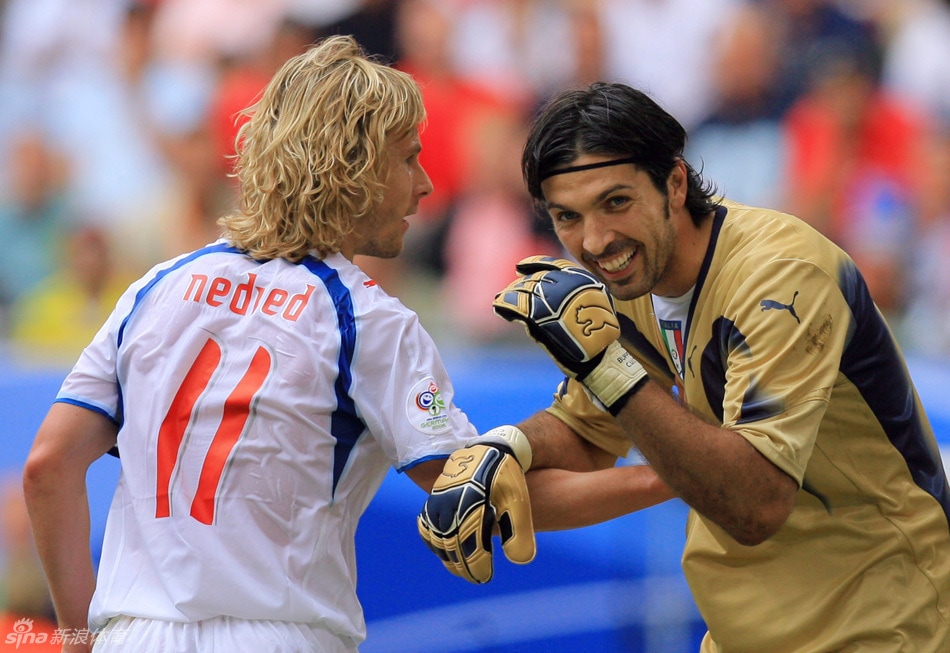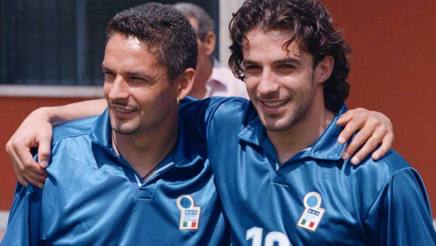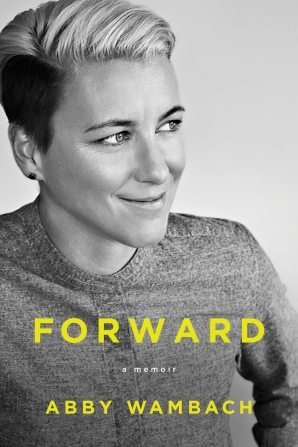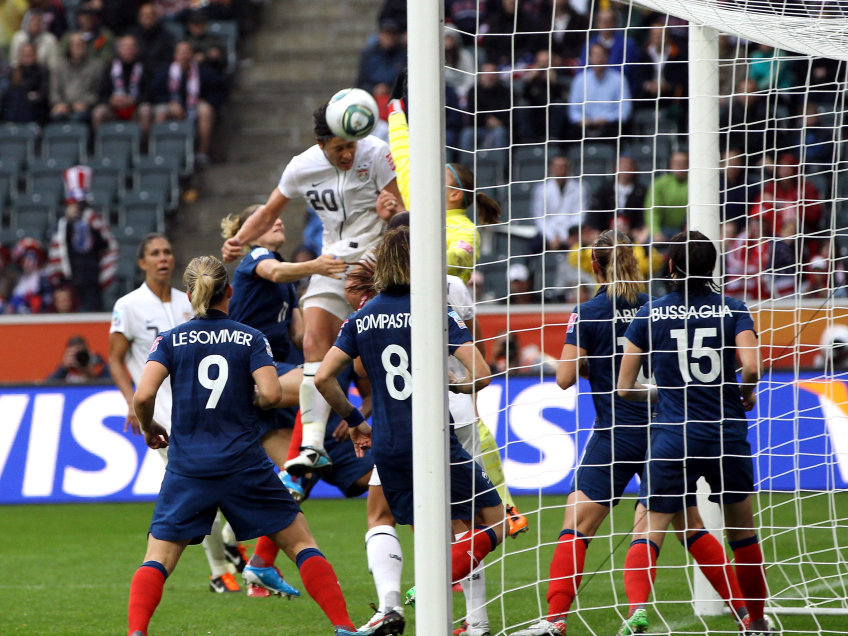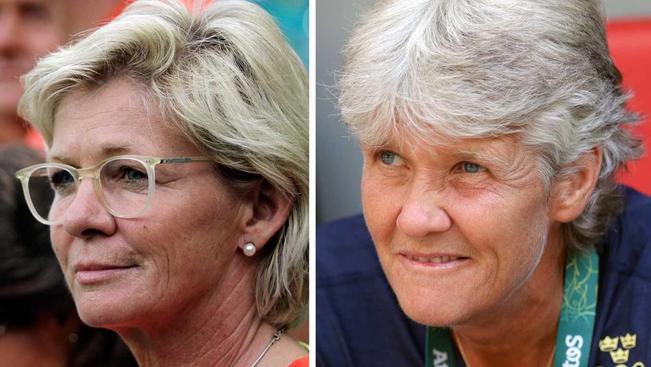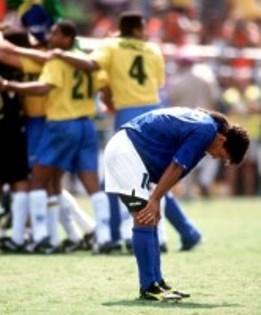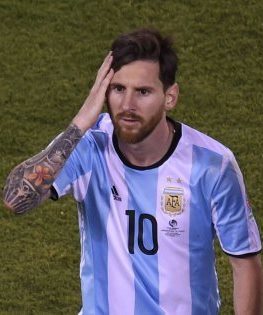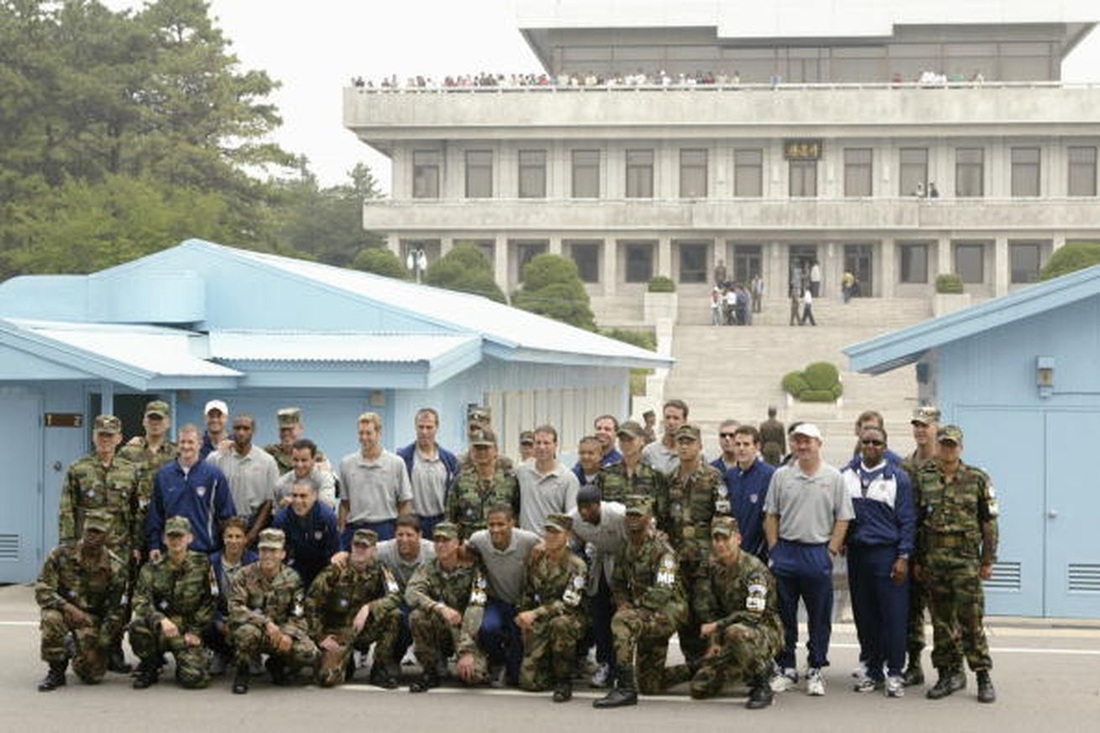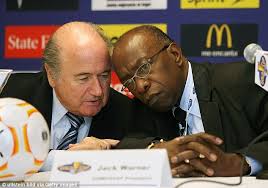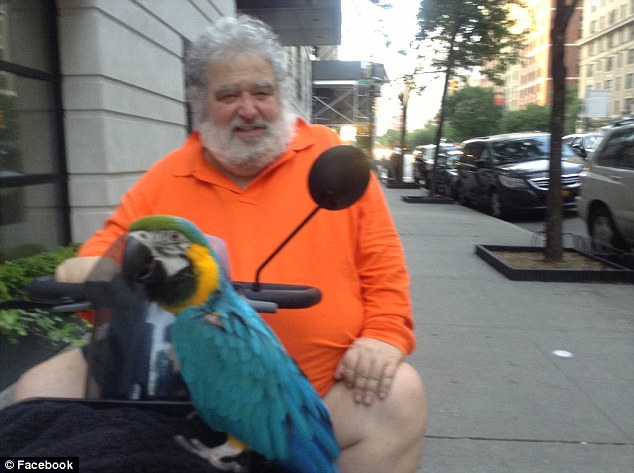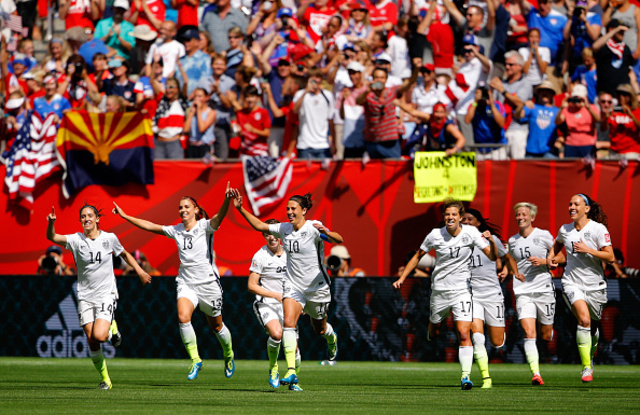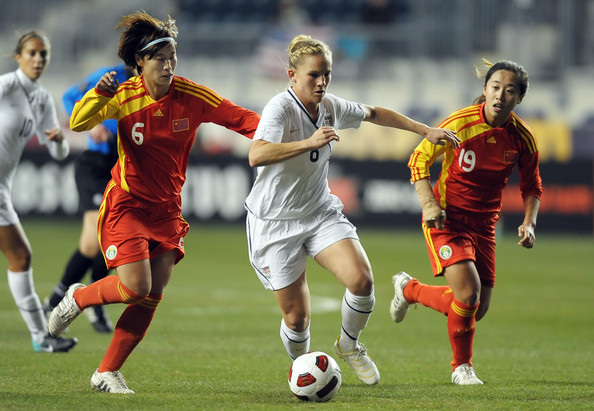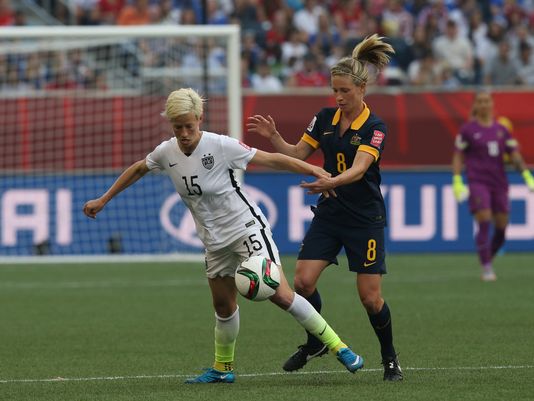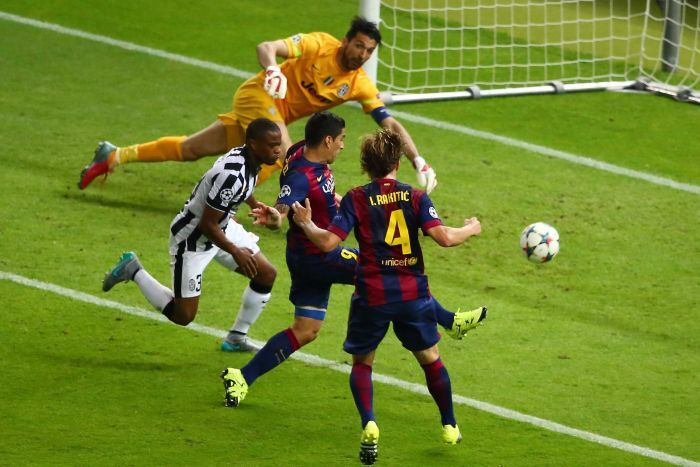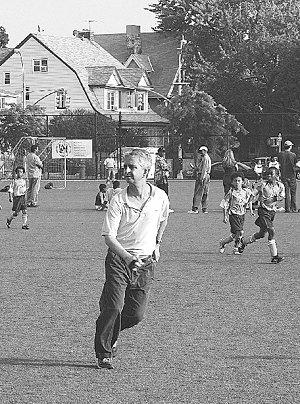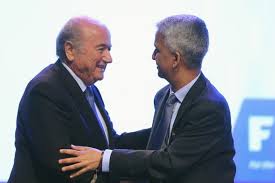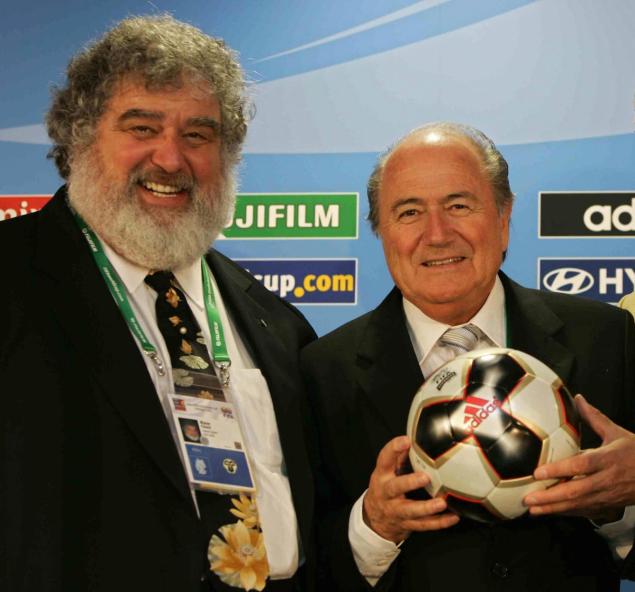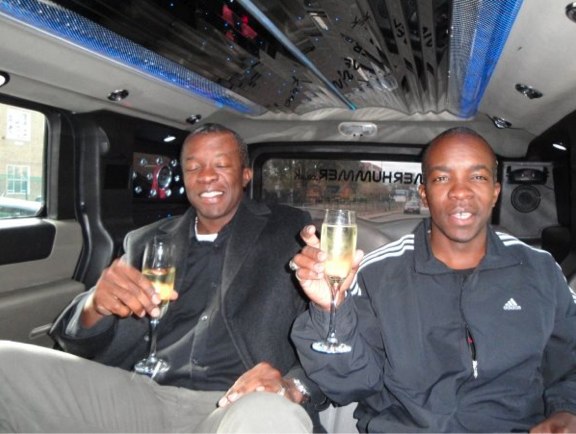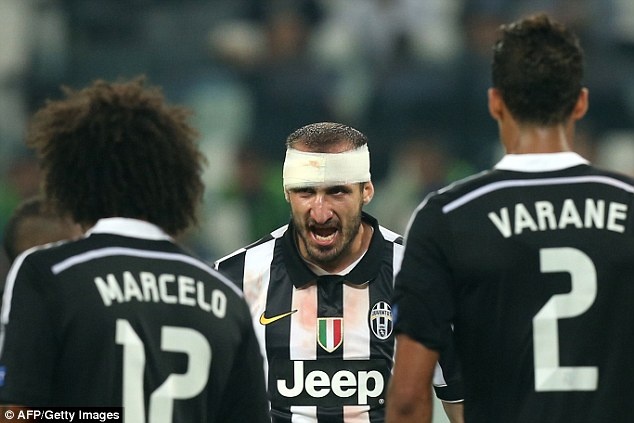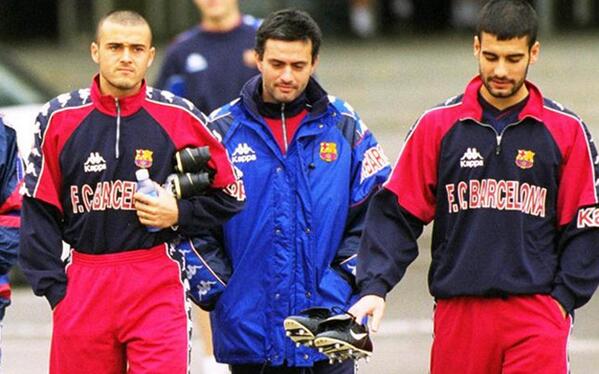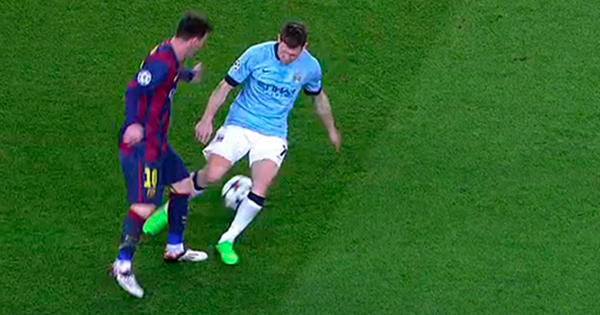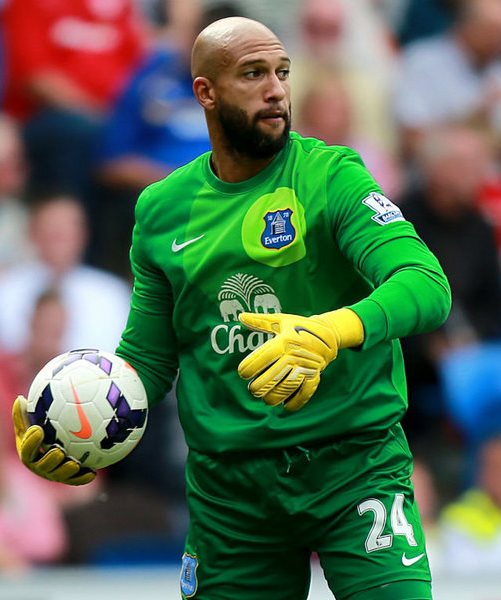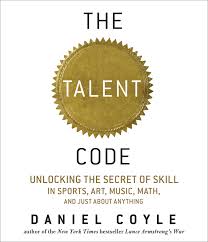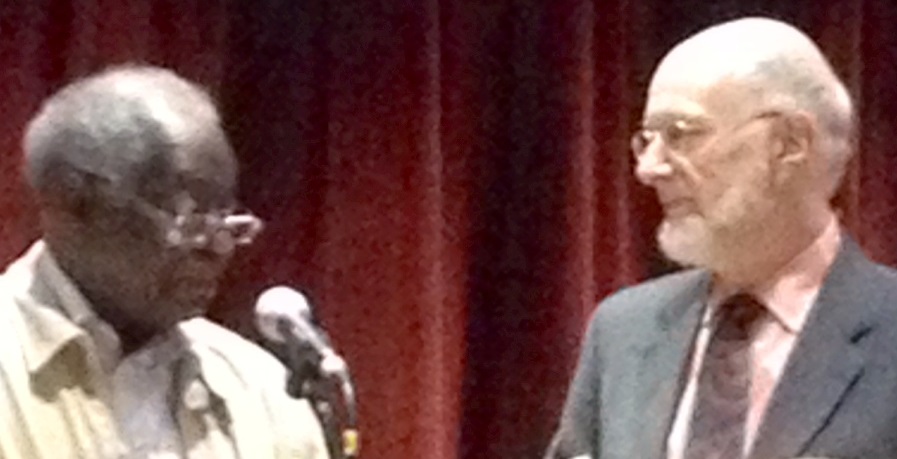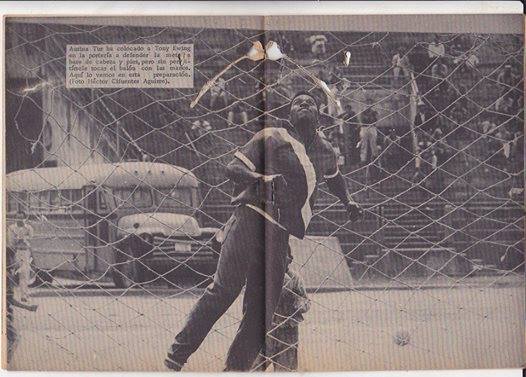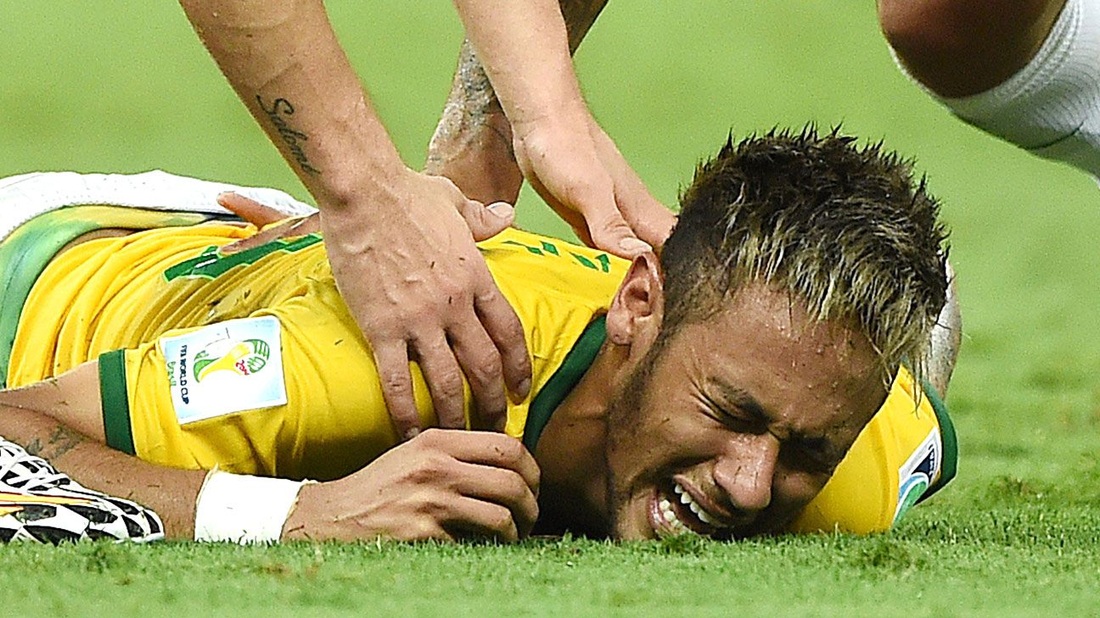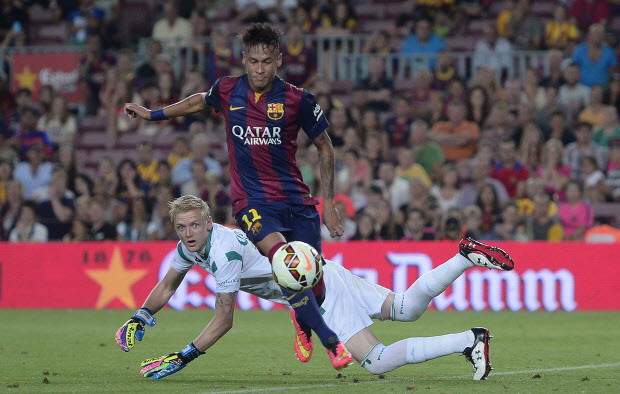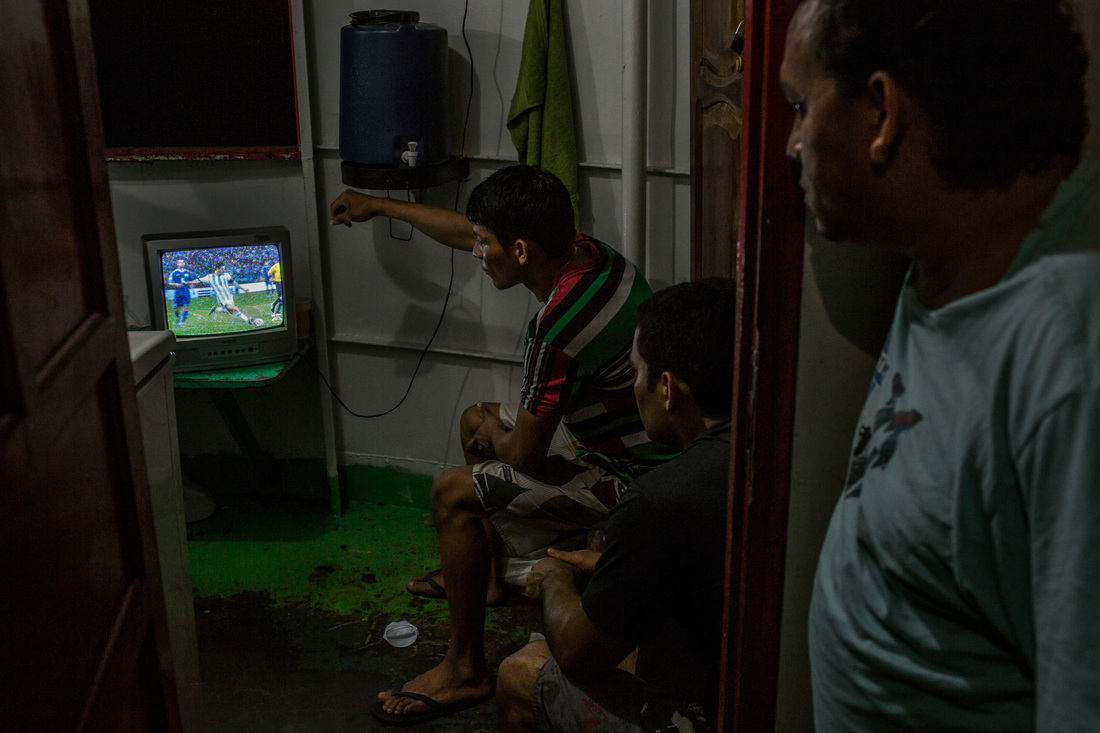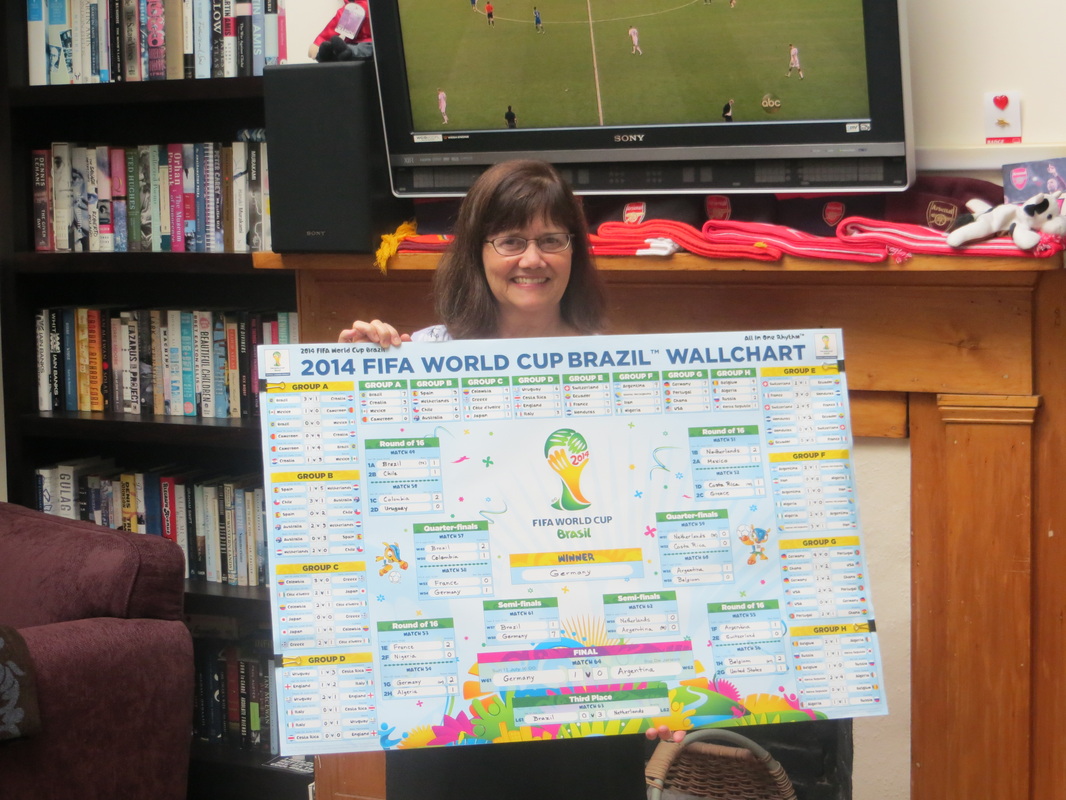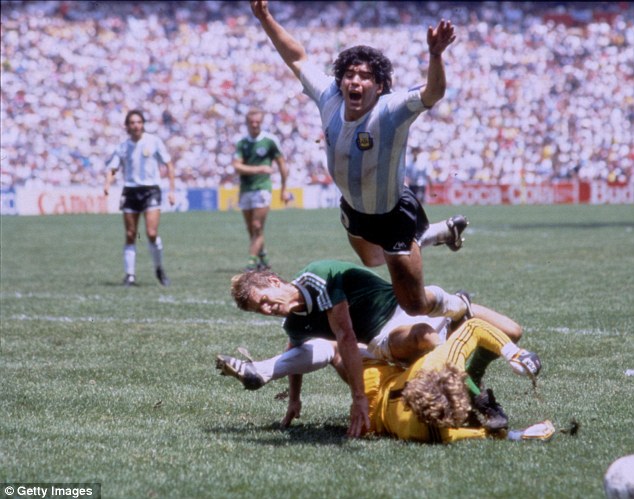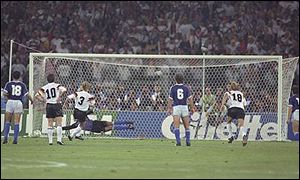|
Anybody else watching the World Baseball Classic on the dawn patrol?
It's hard to tell the players without a scorecard – and a genealogy printout. National identities blur, and so do team and league ties. Those two players who collided at home plate the other day? Why, they are teammates – Sal Butera of Italy crashing into Salvador Perez of Venezuela, both of them catchers for the Kansas City Royals. In real life, Perez is the star and Butera is the backup but for these few weeks they are playing for national teams, and playing it hard, and playing it right. Butera was trying to score a run that Italy had to have, and Perez moved into his path, and took a hit. The word from Perez is that his knee may not be as badly injured as was feared, but time will tell. There was nothing dirty about the collision. In fact, it was a common sight in international sport: people who spend an entire league season together suddenly represent other nations. Butera, an American, has Italian background and is entitled to play for Italy. Many of the Venezuelan players live in the States for safety and comfort reasons, as James Wagner pointed out in the Times, but they proudly play for their homeland. Sometimes international play can get nasty, the way it did at the 1992 Olympics in Barcelona when the American Dream Team of basketball met soon-to-disband Yugoslavia. Toni Kukoc was about to join the Chicago Bulls after receiving a huge contract that frosted a couple of Bulls named Michael Jordan and Scottie Pippen who hounded and trapped and jostled Kukoc with a fervor that could only be labelled personal. Welcome to our world, they said, with their elbows and hands and hips and knees and hard stares. (Read all about it in a story by the late Alan Greenberg in the Hartford Courant.) The World Cup of soccer mixes friendships and rivalries and guild-member respect. Men who spend the entire season together in the same jerseys try to beat their pals for 90 minutes – and then exchange jerseys and hugs. One great example was the 2006 World Cup first-round match between Italy and the Czech Republic. Gigi Buffon, the Italian keeper, was sticking with Juventus, which had been downgraded to the second division because of a scandal involving team officials and referees and gambling. His Juve teammate, Pavel Nedved, was also sticking with Juve while other mainstays were exercising their right to leave. On this afternoon in Hamburg in 2006, they were opponents – who happened to know each other’s moves. Three times in that match, Nedved took a shot on his pal, but Buffon stopped him. At the end of the match, a 2-0 Italy victory, they embraced with obvious respect. “Oh to be a fly on the wall of the Juventus dressing room when this pair report back for pre-season training,” said the play-by-play on the BBC web site. Italy went on to win that World Cup (remember the Zidane head butt on Materazzi, an old tormentor from Serie A?) and Nedved retired from the Czech national team but helped Juve's comeback through 2009. Today, Nedved is a youth coach with Juventus and Buffon is still the emotional keeper for Juve and the Azzurri. Recently Nedved told a Czech paper that he hopes Buffon will play until he is 50. Their World Cup match against each other is part of their bond. * * * The subplots are also fascinating in this Baseball World Classic – including the tangled but verifiable ancestries of players, that produces an American named Ty Kelly (with a Jewish mother) playing third base for Israel. (Ken Belson’s stories in the Times have caught the mood perfectly.) Israel won its first four before losing to the Netherlands in the Tokyo Dome on what I think was Monday evening. In their time zone in Israel, Hillel and Mendel, who often comment on this site, have been following Destiny’s Darlings. Hillel Kuttler was interviewed about baseball madness in the Holy Land: https://www.facebook.com/i24newsEN/videos/721330744702264/ While Israel was 4-0, Mendel Horowitz cited great runs by Cleveland and the Cubbies in the World Series, the rally by the Patriots in the Super Bowl, the comeback by Barcelona in the Champions League, and, yes, even the shocking election victory by the candidate-whose-name-shall-not-be-spoken. Israel was hammered, 12-2, on Monday but Horowitz still has his theme: “The Year of the Impossibles.” Roberto Baggio drew attention with public acts of great imagination but that is long over.
He was a relatively simple person who could stun a stadium, a nation, with sudden feats -- a gift, a blessing, like the goal from nowhere that saved Italy in the 89th minute against Nigeria in 1994. Now, says the convert to Buddhism, life is a daily search for happiness. For his 50th birthday, he did not need glamour, but instead he made a trip to the region of Italy struck by a monstrous earthquake last Aug. 24, and brutally shocked again recently. He saw devastated buildings and disrupted people. Baggio stood impassively when he botched his penalty kick to end the 1994 World Cup final against Brazil. That was terrible, of course, but he did not make operatic gesticulations, and did not bring up the hamstring that Bulgaria had pounded in the semifinal. The earthquakes are real life. Baggio does not coach, does not seek the spotlight in the big cities; he gave up his familiar ponytail when his hair became predominately gray. He does not haunt his old squads like Juventus and AC Milan (where he helped win Serie A championships.) He is a paradox – a Buddhist who likes to hunt small game. (A good friend of mine has Baggio’s voice on his cellphone, asking if a certain piece of equipment might be found in a sporting goods store in the Stati Uniti.) And for his 50th birthday he chose to visit Amatrice. At one point he said he would like to see what can be done.The video will show an inner-directed man clearly suffering as he walks through the broken town, and then he cries and cannot speak anymore. * * * Of course, Baggio’s 50th birthday was not forgotten. Perhaps the sweetest tribute came from Alessandro Del Piero, who played with Baggio for two seasons at Juventus, and replaced him as artist-in-residence for the Azzurri. What a string of brilliance, from Il Divin Codino (The Divine Ponytail) to Il Pinturicchio (an Italian painter.) They scored goals and they assisted on goals and they played for the best squads in the generation-plus when Serie A was undisputedly the best league in the world. I don’t think I have ever read a more beautiful tribute from one athlete to another: http://www.alessandrodelpiero.com/news/buon-compleanno-roby_541.html Baggio and Del Piero both suffered insults from the Juve owner, Gianni Agnelli: In 1994, Agnelli described Baggio as “a wet rabbit” after a poor performance against Mexico. But Agnelli later compared the master Baggio to the young Del Piero as Raphael against a lesser painter of small stature (Il Pinturriccio.) It’s nice to be the boss. Baggio and Del Piero had so much more in common – the No. 10, the genius, the awareness, the modesty. Seeing them photographed together gives me shivers of memory, from their long reign of artistry. We always remember the first time. Somehow or other, I had never witnessed the live pre-game ritual of Liverpool fans singing “You’ll Never Walk Alone” -- until last Tuesday. Real soccer fans have witnessed it dozens of times, but I must be slow. Bummed by winter, a nasty bug, and the toxic new regime in my country, I tried to lose myself in a match -- starting with two minutes of Anfield stadium performing “You’ll Never Walk Alone,” with perfect timing, perfect enunciation. (I’d seen it and heard it, of course, but never live, right before a match.) This beautiful song is from “Carousel,” by Rodgers and Hammerstein in 1945, at the end of a war that almost took the world down. I still get teary when I see the Gordon Macrae-Shirley Jones movie, set in coastal Maine. From what I read, “You’ll Never Walk Alone” became an anthem in Liverpool in 1963 when fans poured their hearts into a pre-game pop song on the loudspeaker – and immediately elevated it into the team’s greatest tradition. You can read about it here: http://wrti.org/post/youll-never-walk-alone-story-behind-rodgers-and-hammersteins-beloved-song-hope Soccer once again served as a diversion this week. And who doesn’t need at least a momentary diversion in these scary times? After the group singalong – red and white scarves waving -- I watched powerful Chelsea hold off the home team in a 1-1 draw. Rory Smith, the very knowledgeable Brit who is covering Euro football for the New York Times, was underwhelmed by the match, but I was intrigued by the mischievous free kick goal by David Luiz of Chelsea when he spotted the Liverpool keeper dawdling and stepped past his teammate Willian to let one fly. (The keeper’s cock-up, from “Howler:”) https://whatahowler.com/what-went-wrong-for-simon-mignolet-on-david-luizs-sneaky-free-kick-6d830f297dee#.fk9gbxh0w Mediocre the game may have been – but at the extremely high level that Americans can only dream about for our stadiums. Soccer continued Wednesday with a desperate Hull, facing relegation, gritting out a 0-0 draw with underperforming Manchester United – at Old Trafford. As a fan with no dog in the Premiership, I admit I enjoy seeing Man U humbled at home. Speaking of big dogs, the United States is in big trouble for qualifying for the 2018 World Cup in Russia – no points in the first two qualifiers. The federation recently brought back Bruce Arena to try to rescue the four-year effort, before a pair of two “friendly” matches, but the first match was a thoroughly humiliating 0-0 draw with a third-string team from Serbia. In the break between the two friendlies, Captain Michael Bradley – a hard competitor who usually keeps his thoughts to himself -- gave a typically neutral response to a question about Trump’s willy-nilly attempted ban on travel by people from seven mostly Muslim countries. But after deliberating, Bradley sent out an Instagram of depth and thought, including: “The part I left out is how sad and embarrassed I am. When Trump was elected, I only hoped that ... President Trump would be different than the campaigner Trump. That the xenophobic, misogynistic and narcissistic rhetoric would be replaced with a more humble and measured approach to leading our country. I was wrong. And the Muslim ban is just the latest example of someone who couldn’t be more out of touch with our country and the right way to move forward.” Bradley seemed to represent athletes who compete against opponents of all races and religions – far different from the white citizens’ council assembled in DC. After taking his stand, Bradley was rested for most of the tepid 1-0 victory over a reconstituted Jamaica squad Friday night. Most of the American regulars were otherwise engaged in European leagues, so the game served as a tryout for a few spots on the 2018 squad – if it gets to Russia. The match also served as diversion, even while a Washington judge reminded the office-temp President that this remains a nation of laws -- and acceptance. Earlier in the week, I got to hear a live rendition of “You’ll Never Walk Alone.” I can only hope this erratic new “government” does not force the U.S. to walk alone. 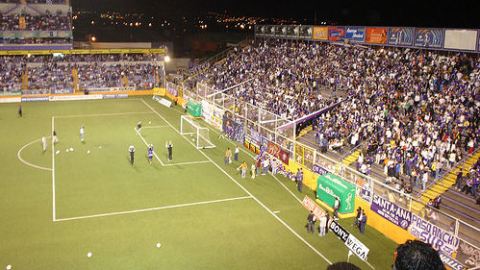 They might as well have been playing in nasty old Saprissa They might as well have been playing in nasty old Saprissa It was a blessing that Tuesday’s USA-Costa Rica English broadcast vanished onto a channel not on my cable package. At least that gave me a chance to brush up on my modest Spanish via NBC Universo, bless its heart. The Yanks were visibly awful to the eye, 4-0 to Costa Rica, as Juergen Klinsmann’s regime began to teeter. But I did manage to process a few observations by the broadcasters, speaking quite clearly. “Treinta dos minutos,” one said while the game was still scoreless after 32 minutes. "Donde está Jermaine Jones? Donde está Michael Bradley? Y no aparecen.” He was inquiring about the two veteran midfielders, allegedly the engine that coordinates defense into offense. “And they don’t appear.” Minutes later, one of them noted that the American team “no tiene alma” – does not have soul. The English word might be “heart” or “grit” but the point was the same. The lads were dragging. No leadership. No vision. No will. This team misses the fiery presence of Clint Dempsey, recovering from a heart ailment. Then it got worse as the defense fell apart late in the first half. I’ll spare the details. The Spanish broadcaster repeated the “no tiene alma” observation in the second half. This was not regional gloating, the kind of home-turf gamesmanship familiar during the quadrennial qualifying round. The broadcast was quite professional, including a nice pre-game package on the Latino roots of many fervent American fans. The match was played in a modern national stadium, built in 2011 (with Chinese help). I covered the loss in 1997 in the nasty little Saprissa stadium, where fans easily lobbed nuts, bolts, baggies filled with urine and invective at the American keeper and defenders. No, the current setting is, if anything, too distant for good camera work. But nothing could hide the rot in the American program. Michael Bradley, arguably the most consistent force in the South Africa World Cup in 2010, has deteriorated into a responsible captain who cannot track on defense or start anything on offense. Bradley is paired with Jermaine Jones, a hard man out of Germany, now old and injured, whose intimidation does not work anymore. Where have you gone, Claudio Reyna? The back line is worse. John Brooks gets off message upon aggression. (Soccer America graded him a 1; don't know that I've ever seen that before.) Omar Gonzalez seems narcoleptic, should have been dropped after 2014. Timmy Chandler once looked like the right back of the future; nothing like that ever happened. The offense, such as it is? Bobby Wood and Jozy Altidore, up front, with Christian Pulisic given license to roam – were collectively “neutralizados.” Neutralized. Pulisic, just turned 18, may be a wunderkind for Dortmund, surrounded by 10 Bundesliga stalwarts, but on this squad he is not ready for the creative role Klinsmann has assigned him. This venture into the challenging Hexagonal was always going to be rough, with Mexico at home and Costa Rica on the road to start. Klinsmann somehow made it worse with a bizarre three-player back line against Mexico and his players could not adjust. I’ve ranted long enough. The non-sneering tone of the Spanish broadcasters confirmed this was a disaster in any language. The Hex will not resume for four months. The good news is that Jones and Chandler will be suspended for the next game because of two yellow cards. I’m not sure there is anything to be done with Klinsmann at this point, but this team needs overhauling, by somebody. * * * PS: My friend Ridge Mahoney writes that it's time for Klinsmann to go. Your thoughts? www.socceramerica.com/article/71236/klinsmanns-promises-of-progress-are-not-to-be-fou.html?edition=16425 Abby Wambach hurled herself into the scrum, raised her forehead above the crowd, and drilled home more goals than any player in American soccer history.
She took her hits, including a gruesome broken leg, but remained a towering presence even as a role player and leader in her last Women’s World Cup which she helped win in 2015. Now she has revealed more about herself in a brave and revealing new book, “Forward,” written with the help of Karen Abbott. She talks about her use of alcohol and pills, and says she is clean and sober now. (Disclosure: The editor of this book at HarperCollins is the talented Julia Cheiffetz, who brought a better baseball history book out of me than I ever could have done on my own.) Wambach also talks about realizing she was attracted to women, and how she came out to family, friends, teammates and the public. More than any athlete I have read about, Wambach is open about the touches and glances and courtships and breakups in her private life – plus, how her moods have disrupted her marriage to a former teammate. Wambach also talks about the challenges of being large and athletic from an early age – taking the hits on the field, and off. At least once in college she jumped a football player who had made a comment about her. The injuries and stress are right out of Peter Gent’s book, “North Dallas Forty,” in which football players need this pill to get going in the morning and that pill to go out on the practice field, and that other pill to mask the pain afterward. The pain of soccer and the pain of her inner life seemed to overlap for Wambach, although she was fortunate to have a strong family, a close male friend since college, and several former companions and teammates who came to realize her torments. In one of the strongest moments in the book, Wambach’s team roommate, Sydney Leroux, married and “straight,” realizes Wambach is crying in the next bed, and removes her ear plugs and then takes “careful steps to my bed. She lies down and makes room for herself, crying right along with me.” Leroux and others offer wise intervention, but is it enough? After several attempts at sobriety, Wambach stops drinking and abusing pills, which is where the book ends. Having written a book with an alcoholic baseball player, Bob Welch, I am a strong supporter of organized rehab. Bob went through an emotional month at a center, and I later spent a week at the same clinic so I would understand Bob and the process. The first step is admission of powerlessness. I think Wambach is saying she was powerless over alcohol and pills, so I wish she had put herself in an organized setting, to be confronted by trained counselors and recovering addicts and friends and family. As she knows from her 184 goals, the best headers come from a buildup and skilled passes from teammates. Abby Wambach is now doing television commentary and making speeches, being presented as a role model. I am rooting for this complicated and passionate person, as her story goes “Forward.” American boorishness is not confined to domestic usage. We export a good bit of it, too.
I am thinking here of the disgraceful behavior of Ryan Lochte and Hope Solo in the past two weeks. Lochte apparently has spent so much of his life in chlorine that it has pickled his brain. He did not realize Brazil just might have security cameras that would detect an Olympic celebrity with dyed light blue hair after he and three pals claimed to have been robbed at gunpoint. (It appears they broke into a restroom. Geniuses.) Solo indulged in unsportsmanlike whining after the American soccer team was defeated by Sweden, calling her opponents “cowardly” for their conservative tactics. Solo was detracting from Sweden’s coach, Pia Sundhage, who used to coach the Americans. The Swedes lulled the quicker, more potent Americans into forays, and then struck on the counter-attack. But let’s pass over the two loutish athletes and concentrate on the women’s final Friday as Germany outlasted Sweden, 2-1, to win the Olympic gold medal. Women’s soccer has only been in the Olympics since 1996, and this was the first time two female coaches had reached the finals – Silvia Neid of Germany and Sundhage of Sweden, both of whose athletic sideline prowling and grayish manes allow me to use the word “leonine.” Sundhage is one of the really cool coaches I have ever met. Sometimes to loosen up her players she will emit a folk song. When the U.S. beat Brazil, 1-0, in the finals of the Beijing Olympics in 2008, the press prodded her to sing Bob Dylan. She obliged with a quickie from “The Times They Are A-Changin’.” I have a personal short list of coaches I would like to have played for, if I were an athlete, that is -- Gil Hodges in baseball, Al Arbour in hockey, Dean Smith in basketball and Herman Edwards in football. (Edwards is a guru who earnestly tried to teach doltish reporters to trust our own faculties. He had a mantra: “The eye/Don’t lie.”) A decade ago, I expanded my list to include Sundhage, the wandering Swede, who was coaching the Americans, quite successfully. It annoyed me when Solo made a spectacle of herself by asking for replacement keeper gloves when Sweden had a chance to clinch with the next penalty kick. The Swedish kicker converted, anyway, and soon Solo ripped Pia’s hunkering tactics, which have merely won championships. I saw Italy’s men win the 1982 World Cup by using an updated version of the catenaccio (the bolt, or chain, in Italian) defense – tight back line, and counter-attack when an opening presents itself. "Let's inspire, let's be badass, let's be fierce, let's be competitive,” Megan Rapinoe, the artful American winger, told NBC the other day. “But we're gracious and we're humble, and we play the game a certain way, whether we win or lose." Rapinoe added, “And we've been on the winning side quite a bit, and when we find ourselves on the other side, we need to handle that graciously, and unfortunately that wasn't the case." Sweden lost as Germany, looking fresher and faster, scored once, pressured an own goal, and then hung on defensively (would Solo say “cowardly?) Now the question is, what does the footloose Sundhage do next? Recently, Henrik Rydström, a member of the Swedish national men’s squad, suggested that Sundhage would make a fine coach for his team. A reporter asked Sundhage whether a woman could really coach a national men’s team. Her response, in Swedish, as translated by Business Insider: “Well, then, let me ask you a question. Does it work with a female chancellor in Germany?” Pia then spelled it out for reporters: “Angela Merkel” (is running) an entire “f------ country. Clearly it works.” Clearly, female coaches work for female players. And let me throw this out: there is another country that seems 88 percent likely to elect a female President in November. One of these years, Juergen Klinsmann will move on. Pia Sundhage should be on the short list. Plus, she already knows our folk songs. (Anybody notice that the Mets have won four straight since I got off them?) Everybody knows the Welsh can sing. We learned that from visiting our friend Alastair in the Brecon Beacons years ago -- concerts in the beautiful cathedral. Nobody talked about Welsh soccer back then. Mostly it was about great rugby teams in one valley or another. On Friday I learned that even Welsh footballers can sing, during the anthem before the quarterfinal against Belgium. The eleven starters all had good voices, as the camera panned them from a few inches away. Then they stunned Belgium, 3-1, in the quarterfinals of the Euros -- merely the greatest result in Welsh soccer history. During the match, I tried to text a friend from those long Wales summer evenings, but I could not make contact. Umm, ever try to find a David Thomas in Wales? Dude, I'm sure you were watching. Oh, about the singing. When Wales went ahead in the second half, the choristers in the stands of Lille came up with a new ditty -- Are You Watching, England? I want to thank the Amazing Metropolitans of New York for stumbling in recent weeks, to let me concentrate on the Euros -- with Iceland, Wales and Poland all making it into the quarterfinals of the Euros. Iceland's demolition of England was even more of an upset than the Welsh victory. Check out this great article in the Guardian by Barney Ronay: https://www.theguardian.com/football/2016/jun/08/iceland-stunning-rise-euro-2016-gylfi-sigurdsson-lars-lagerback Now it's time for Italy against Germany on Saturday, followed by Iceland against France on Sunday. Wales plays Portugal in the semis. No time for any Mets angst. * * * (This is what I wrote after the recent Copa America in the U.S.) The images overlap – the victories and the failures; the artistry and the butchery.
Even in the New World, we are starting to accumulate a national memory of soccer. From sea to shining sea, epic letdowns for tragic princes. Even the American team is starting to develop overlays, collective memories of better days in a nation still searching for technique and flair and gall. (More below) But first, the disasters of the talented – Roberto Baggio of Italy skying the final penalty kick on a muggy afternoon in California in 1994, Lionel Messi of Argentina sending up a wayward drone on Sunday evening in New Jersey. They were the designated geniuses, expected to weave and dodge their nations to championships, but in the brutal schedule of soccer, Baggio, playing on a wobbly knee, missed against Brazil in the World Cup final, and Messi -- worked to exhaustion like a coal-mine mule -- missed against Chile in the Copa América final. Messi said after Sunday’s match that he will never play for his nation, and probably that is best, but his legacy will be zero championships for Argentina in his time. By contrast, stubby, paranoid Diego Armando Maradona cheated and smirked – and won the 1986 World Cup, single-handedly, you could say. Gall counts. Maradona strutted like Al Pacino in “Scarface.” Messi carries himself like a workman, head down. When Argentina fell short against oncoming Germany in 2014, I suggested – for the paperback version of my soccer book – that Messi was lacking the moxie of a truly great player. I caught some stick for my position but I believed it. In the long run, the grand sum of his goals for Barça may stem from the fertile brain of Andrés Iniesta. In a recent unguarded moment, close to an open microphone, the aging lions, Maradona and Pele, mused about Messi. -- I don’t know him, Pelé said. What is he like? "He's a really good person, but he has no personality," Maradona said, adding: "He lacks character to be a leader." Classic self-serving Maradona, of course, but probably incisive. For all that, for Messi’s flubbed PK against Chile, Argentina also left the earlier impression of carving up the youths and graybeards of the United States, 4-0, in the Copa semifinal last week. The very same players who hacked and dove and stumbled along with exhausted Chile in the final imposed a moving geometric light show upon the upstarts from North America. For one humiliating night, the Americans were back to the mismatches of the ‘80s into the ‘90s. There are so many levels of soccer, and it changes from day to day. But let’s move from Baggio and Messi to the Americans. Beyond the failures in the semifinals and finals, Team USA has showed collective growth in the time of Klinsmann. They are now expected to be more brash, to take chances, to run the sidelines, to push the other team, the way adventuresome and fleet Klinsi did in multiple leagues. Klinsmann has tried to implant his innate understanding of the game, at some higher level, in the psyches of his players. Yet it may also be that Bruce Arena and Bob Bradley, both under-appreciated because they are Americans, had better players at their disposal – world-level keepers in their prime, Donovan and Reyna, McBride and Dempsey, some of the defenders. It may be time to move on – not for Klinsmann, who has a contract through 2018 and, to me, is not a failure, but for the core of the team. Fans keep suggesting that Dempsey’s time is over; good grief, he is the guts of the team. However: in the second half of the third-place match Saturday night, needing a goal, Klinsmann pulled the captain, Michael Bradley, to get a fresh touch in there. It may have been a telling move. Bradley was perhaps the best player in South Africa in 2010, young and hard and disciplined, but he hasn’t been the same player in 2014 or 2016. He and Jermaine Jones just don’t work in midfield; I love Jones’s brutish swagger – every team needs a hard man -- except when he overdoes it. It may be time to move on. In the third-place match, in the final 15 minutes, Klinsmann went to 17-year-old Christian Pulisic, the kid from Hersheyland, (check out this terrific profile by Jacob Klinger) who plays for Dortmund, one of the great world clubs. Due to the complexities of Fox, I could not find the match in English, so I listened on Univision, and heard one commentator say "Pulisic me encanta” – I love Pulisic. The kid ran out there and found a few openings, raised the tempo. The commentator added that Pulisic was neither a Landon Donovan nor a Tab Ramos, but himself. The future is out there, somewhere. When I was a young baseball writer, Casey Stengel used to say that he was looking for the Youth of America. “They aint failed yet,” Casey said. Works for soccer, too. But just remember this: Argentina and Italy are two of the great football dynasties in the world – and the price of that patrimony is two tormented geniuses, vastly different people and players, who failed in the ultimate moment, and understood, by the code of the game, the extent of their failures. The United States can only hope to risk that kind of failure, somewhere out there in the future. Donald Trump has been yammering about making South Korea pay for American services.
I doubt he knows anything about South Korea, other than he may have a property there. In 2002, I accompanied the American soccer team’s visit to the DMZ between South and North Korea, while the team was preparing for the World Cup. The federation was kind enough to allow journalists covering the team to come along, on a separate bus. We all walked from a staging area toward the buildings at the border. Officials had told us to dress conservatively – no shorts – and not to wave or smile at people on the other side. They impressed on us that this was serious business. We had been told of the time in 1976 when North Korean soldiers attacked with axes, killing two American soldiers who were pruning a tree. Since then, security had been even higher. Soldiers from both Koreas stood a few feet apart, glaring at each other. They worked short shifts, to remain at peak alert. Behind the South Koreans on the front line were American soldiers, in great shape, well-spoken, the best and the brightest. These were not hired hands, to be withdrawn over a labor dispute. These were warriors, guarding what President Clinton once called “the most dangerous place on earth.” When we walked back to the buses, we were made aware of barracks where soldiers from South Korea and the United States were waiting, literally seconds from possible combat. These were partners, protecting a flourishing democracy, in effect standing guard for much of Asia and the world. I remember DaMarcus Beasley, one of the most observant of American players, shaking his head and letting us know he had come with no idea what went on there. But now he did. Everybody heading back to the buses seemed reflective. Some younger Korean journalists told us their parents and teachers had not impressed them about the danger a few miles north. Anybody with normal learning ability would have realized the serious issues at that border. As President Obama said Friday at the nuclear summit: “Our alliance with Japan and the Republic of Korea is one of the foundations, the cornerstone of our presence in the Asia-Pacific region. It has underwritten the peace and prosperity of that region.” The American presence at the DMZ -- and backing up Japan -- was not some hotel deal to be re-negotiated, in Trumpian fashion. The most diabolical aspect of the FIFA election was the little stipulation in the bylaws left behind by Sepp the Devious.
The rules stipulated that any new president must have been active in world football in two of the past five years. This guaranteed that all five candidates would be insiders, by definition. Two years of “service” guaranteed that candidates had been in the vicinity of envelopes crammed with American bills, being slipped to some FIFA delegates. . (See: Qatar, 2022.) Two years of recent “activity” meant that candidates had pondered – or even known -- how Chuck Blazer of New York had afforded that colorful parrot on his shoulder, or lodgings at the Trump Tower and warmer climes, and how Jack Warner of Port of Spain was able to use development money from FIF to build facilities on land belonging to him. Normal human curiosity might have compelled any FIFA official to ponder, “Hmmm, I wonder how that guy does it.” For all the new rules for "reform," the two-year rule guaranteed that the lords of FIFA, now under world scrutiny for the first time, could not even dream of hiring a total outsider, somebody who had never cozied up to the elegant troughs of FIFA. Insurgent members could have gone outside the fraternity and sought out people of broader public service, like Kofi Annan, former Secretary General of the United Nations, or Angela Merkel, nearing the end of her third term as German chancellor. Think big. Or they could have gone to executives from relatively clean corners of business and sports – Dick Pound of Canada and the IOC and WADA, perhaps, or Dick Ebersol, formerly of NBC, or John Skipper of ESPN, or David Stern, former NBA commissioner, or even Mitt Romney, who did a fine job cleaning out the stables of the Salt Lake City Olympic committee. Now they have elected Gianni Infantino, whose only flaw may be that he worked with the double-digits’ worth of banned soccer “leaders,” including the suddenly free-for-lunch Sepp Blatter. This is in no way an accusation of Infantino. But if ever an organization needed a thorough hosing down, FIFA was it. And still is. * * * One last note: none of this would have happened but for that annoying muckraker from the United Kingdom, Andrew Jennings, who pestered Blatter and his cohorts so much that they tried to ban him from open meetings. Jennings made a lot of charges, some of them ultimately devastatingly accurate. Well done, mate. 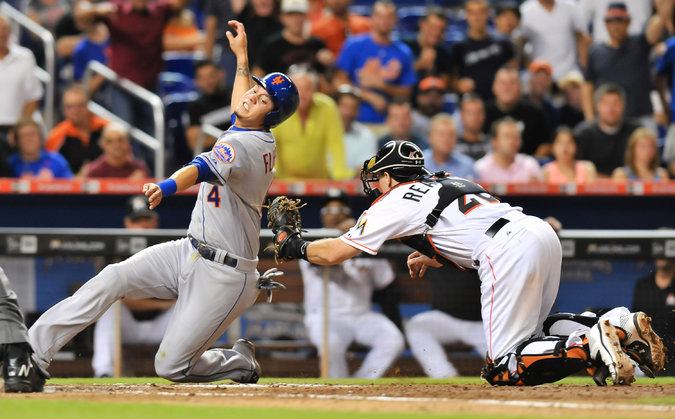 Excellent photo by Steve Mitchell, USA Today, via Reuters Excellent photo by Steve Mitchell, USA Today, via Reuters With a great deal of Metsian guilt, I confess that I wandered around the house Wednesday night after the Mets took a 7-0 lead. Time to get some stuff organized. Had to get ready for the Clown Car Thursday night. Have I learned nothing in 53 2/3 seasons of watching this club? Imagine my surprise when I returned to the radio and heard Juan Uribe saying that in baseball you never know. Still, the Mets have won six straight -- and there is talk about David Wright and Michael Cuddyer getting ready to come back. Ummm. That's all I'm saying. Meantime, the summer doldrums keep getting postponed. Already a people's choice for his tears last week, Wilmer Flores evaded a tag Tuesday for a crucial run in Miami. His slide reminded me of the sideways one-and-a-half gainer dive by Mickey Mantle in the 1960 World Series, to avoid Rocky Nelson's tag at first base, one of the great impromptu athletic moves ever seen on a baseball field. Wilmer Flores. Mickey Mantle. Same sentence. Also red-hot is Ron Darling, who has made himself into one of the great baseball broadcasters. Darling spotted his lodge brother, Jon Niese, the on-deck batter, in a direct line with Flores, urgently waving for him to go wide to his right. Everybody is playing up. In the usual August torpor, I have other things I want to write about, but the Mets have won five straight as of Wednesday morning. "Pitching!!!!" Bill Wakefield, the best reliever on the 1964 Mets, says in an e-mail. "Bandwagon!!!" texts the noted women's soccer writer, Laura Vecsey. "Madhouse!!!" writes David Vecsey, our correspondent from the Mets' ballpark Sunday night. David said he felt the season ratchet up in the eighth inning Sunday when Terry Collins let Noah Syndegaard deal with Brian Harper with two outs in the eighth. The kid blew away the kid with 99-mph heat. It is on. I have run out of vapid attempts at profundity. It’s summer. Humidity saps the brain. I have seen family and friends, gone swimming, watered lawns and flowers. We went to Queens for the National Theatre in a movie house.We went to Hicksville for dosa. Mostly, the days and nights are built around the Mets I sold myself to the devil last winter when the snow was piled high and there was nothing on television as usual. Please, I bargained, just make this a good baseball season. The devil has kept his end. The Mets are captivating, even when they lose. This is why baseball is the greatest game. They play every day. This past week has been one of the weirdest stretches I have ever seen. You know all this already. On Wednesday, Wilmer Flores heard rumors from the selfie crowd that he had been traded. Flores cried. The social-media gossip was premature. My son and I texted each other: What’s wrong with Familia? Wait, can they trade Wheeler after surgery? On Thursday, the front office clarified: no trade. On Friday, the Mets got Yoenis Cespedes, but kept Flores. (Gardening note: The Mets now have players named Lawns and Flowers in Spanish. Make of this what you will. Perhaps they will trade for a player named Árboles.) On Friday, Flores ended the game with a homer. My son texted Well, that was obviously going to happen. I have never seen players embrace a teammate so fervently. Ron Darling said the same thing Monday night. On Saturday, Cespedes flailed at sinkers. I worried he would turn into this year’s Foy, this year’s Samuel, this year's Vaughn, this year’s Bay, but he could be the great rent-a-slugger the Mets have ever had. Lucas Duda kept hitting homers. I'm sorry I called him a lug. I was building my Sunday around the dreaded 8 PM game. Then on Sunday morning there was a charity soccer match from Wembley. My Arsenal and Chelsea mates watched – together again! – in Brooklyn. Wenger 1, Mourinho 0. Done and dusted, as somebody once said. Sunday night was insane. Too bad ESPN was doing the game. The great Richard Sandomir critiques the office-temp superficiality of national broadcasts. Must read this. On Monday, Cespedes and Conforto and Colon were magnificent. The Mets are in first place. Can’t write now. Things just getting interesting. The truest words spoken after the Women’s World Cup final were from Megan Rapinoe, the most consistent electric charge in the Americans' seven matches in Canada.
“Our benchmark is winning,” Rapinoe said after the 5-2 victory over Japan. “I would think we would have to be considered one of the best teams there ever was.” She and her teammates had the right to celebrate that victory, this World Cup, this championship, this year. They also have the right to be seen in a continuum from the great American team of 1991-1996-1999 -- personified by Christie Pearce Rampone, on the sidelines that day in the Rose Bowl, symbolically on the field Sunday in B.C. Place. The American women are the greatest long-standing national team outlasting the 1980 American male ice hockey team and the Dream Team of men’s basketball put together for the 1992 Olympics. The women have taught Americans to appreciate the sport itself – a slower, less powerful but perhaps more visible version of talent and teamwork and perseverance than the men’s game. Because they came first, I have revered the women of the ‘90’s – the personalities, the skills – comparing them to the Founding Fathers who materialized late in the 18th Century. How could there ever be a collection like Loudy Foudy and Hollywood Chastain and the rest? The other day I drew a line from Briana Scurry to Hope Solo, audacious keepers, but there are also comparisons between Michelle Akers (still the best female player I have ever seen) to Carli Lloyd, who took over a World Cup final. Ever since that evening in St-Denis, France, in 1998, I have believed that the best singular performance in a World Cup final was by Zinédine Zidane, who danced and dribbled and passed and headed France to a championship. Take a look: https://www.youtube.com/watch?v=K6Q2Tyw_PXM Now I am willing to put Carli Lloyd in that category for the women’s game, not so much for grace, although goodness knows it takes footwork to run those routes, but for desire. Lloyd has been aching to be delivered from stodgy peripheral assignments. On Sunday she already had two goals and then lofted a ball from midfield that caught the Japanese keeper out of position, squinting up to the sun, and Lloyd blasted the ball over her fingertips, just because she could – an athlete at the peak of her game. When things calm down, I want to hear Lloyd's description of what she sensed, downfield: Take a look: https://www.youtube.com/watch?v=zT2Pm8vnN9A Later, Lloyd just missed a fourth goal and you could see the bemused look on her face:: Do I dare regret that? Yes, I do. They all dared. They all succeeded. They gave us entertainment and terrific football and also sportsmanship, with Japanese and American players treating each other with respect while competing at a high level. And let us note that FIFA, that disgraced organization, and the absent Sepp Blatter, having as bad a year as Donald Trump, afraid of extradition, did expand the WWC to 24 teams. They gave us new teams that had their moments, like Colombia, out-dribbling and out-juking the Americans in the Round of 16. When the new teams go home, they can tell their federations, look what we did in Canada. There is a growing history to women’s soccer, ranging from Akers to Linda Medalen, the Norwegian cop who loved to bust on the U.S., to Marta, to the Chinese and the Germans and the Japanese, and now the team of Abby Wambach and those magnificent defenders. Brava. 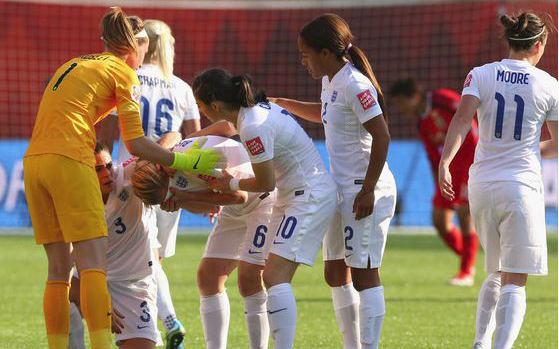 I was so intrigued with England’s reaching the semifinals of the Women's World Cup, wondering if the Lionesses could really make up for the red cards of idiot boys like Beckham and Rooney? The sin and the splendor of Maradona? The missed PKs and the fumbled shots? Does women’s soccer have anything to do with men’s soccer? Not sure. Now the Lionesses have contributed their own bit to England's soccer history, giving up an own goal in stoppage time in the semifinal against Japan Wednesday night. I’m an American with an Irish passport, and me mum was born in Liverpool -- and I have loved the Azzurri since 1982 -- but this had nothing to do with nationalism or patriotism. Caring just a little bit about England in footy seemed akin to a baseball fan rooting for the Red Sox for decades, or rooting for Cleveland in anything. Just get it over with. Now it goes on and on. The start of Wimbledon reminded me of national complexes I have known – going to London in June and seeing head-hanging in cricket, rugby,tennis and particularly in soccer. Ah, yes, England once won a World Cup. The best sports documentary I have ever seen was about the 1966 World Cup – England beats West Germany! At Wembley! Every four years, the “green and pleasant land” goes through agonies I remember from my tormented childhood as a Brooklyn Dodger fan. I thought about English football disasters I had witnessed: On June 30, 1998 David Beckham petulantly kicked Diego Simeone of Argentina and got himself kicked out of a round-of-16 match. England lost the shootout. (Of course, Simeone developed the staggers from the minimal contact, but what was he supposed to do, man up?) On July 1, 2006, Wayne Rooney stomped on Ricardo Carvalho of Portugal for a red card and then stupidly shoved his Man U teammate Cristiano Ronaldo of Portugal in a quarter-final match. (Of course, Ronaldo took a dive, but who wouldn’t?) England lost the shootout. Any England fan can supply dozens of other gaffes in major internationals. I was hoping the Lionesses would be unencumbered by past horrors of the male variety and could overcome the spirit and deft passing of Japan. Instead, Laura Bassett stuck out her foot to try to stop another Japan fast break, and she deflected the ball to the underside of the crossbar. I'm thinking of own goals -- poor Andres Escobar of Colombia against the USA in 1994, the immortal Nicola Caricola, formerly of Juventus, poking in an own goal in the very first match for the MetroStars, thereby setting up a Ruthian Curse for that franchise. John McDermott, in the Comments below, recalls being there when Franco Baresi, my favorite defender of all time, made an own goal for AC Milan. Occupational hazard for defenders. But in stoppage time -- of a World Cup semifinal? Your thoughts? Turns out, the American soccer coach Jill Ellis was exactly right. It did not matter what number was assigned to her formation; what counted was the way the players created their chances.
For the first time in this Women’s World Cup – their fifth match – the Americans showed imagination and teamwork. Amy Rodriguez dribbled. Kelly O’Hara ran. Tobin Heath lashed left-footed free kicks. Morgan Brian distributed the ball. Where have these people been all our lives? The result was a 1-0 victory over China Friday night in Ottawa, leading to a semifinal with Germany on Tuesday in Montreal. I have to add that the energy and cohesion was not merely because Ellis had the wisdom to bench Abby Wambach, thereby allowing Carli Lloyd and everybody else to exploit the spaces and attack on their own. As Laura Vecsey wrote on foxsports.com: "’Freedom,’ is what Carli Lloyd said was the difference, though why that freedom to just play has been so hard to drum up remains a curious problem.” That “freedom” was partially mandated by the absence of Megan Rapinoe and Lauren Holiday, both ineligible because of two previous yellow cards. Rapinoe is probably my favorite player on this team – independent and athletic, fun to watch – although those young defenders have been a revelation. Still, in the stolid American attack Rapinoe had been taking on too much responsibility. With Rapinoe and Holiday sitting in the stands, their teammates busted out of that 4-4-2 stereotype. They were not preoccupied with putting the ball near Wambach’s historic dome and they did not watch Rapinoe trying to do it by herself. They found space and they called upon their own talents. Freedom. I’m not sure whom I would replace to get Rapinoe back in the starting lineup, but her gall and skill will be needed against Germany. The victory over China was a template for this U.S. team. The younger Americans have been let loose I’ve been enjoying the top end of the Women’s World Cup in Canada, particularly the two draws – Germany vs. Norway and United States vs. Sweden.
My sense is that the players are operating at a higher technical and tactical level than in the legendary era of the great American team holding off Linda Medalen, police-officer/captain of Norway, and the Chinese squad that seemed like the future but wasn’t. The players I have been seeing can swing the ball from side to side in ways I don’t remember from the 1996-99 era of Akers-Lilly-Hamm and the rest. They know how to widen the field, find a seam, push a ball upfield through traffic. Watching the Eurohooskies and the Yanks grappling in tight space also tells me they have been working on their WWF tactics necessary in the scrum. It has been a delight to watch Megan Rapinoe take off on angled romps – clearly the most compelling player so far. She is quoted as saying she is doing her Messi impression, but I would compare her more to Cristiano Ronaldo. She’s got more pizzazz than Messi, or you could call it ego. Sometimes Rapinoe holds on to the ball too long, missing a teammate, but then again she scored two goals in the opening victory. There is room for ego in this sport. Rapinoe seems to have a dash of Keyshawn Johnson, the receiver who was heard to say, “Just give me the damn ball.” It’s funny. Before the World Cup, Rapinoe was recuperating, not discussed as a factor, but she is the engine of this team, so far, backed up by energetic younger players named Johnston and Klingenberg and Press and Sauerbrunn. Abby Wambach is a niche player now. I thought she was coming in for a late header Friday, but her real aim may be drawing a foul in the box. She’s been watching the male strikers, who go down easily to juke the referee. There is nothing wrong with learning from guys who are bigger, faster, stronger, and play a game that has been evolving for many decades. The other day I read an essay in the Times proposing lowering the basket in women’s basketball. This is totally nuts, because the women’s game is appealing as it is now – rare dunks, but much more power and elevation and gutsiness than a decade or two ago. The men’s game has become a dunkathon, with muscles. Raise their basket. Maybe that sport would be more watchable. Soccer is still a sport of frustration and patience and trial and error, and once in a great when a footballer like Rapinoe takes a romp. Jogo bonito, personified. It is still the beautiful game, despite the stunted, amoral people who run FIFA. The headquarters will be fumigated, but the sport prevails, still capable of spontaneous beauty. .
Don’t confuse the larceny of the executives, now exposed by the American – American! – justice system, with the talents exhibited in front of the world. Americans used to observe the violence in the stands and streets and blame it on a sport in which ten players cannot use their hands. Now they know better. And their legal system is dredging up the real problem with the world's favorite sport. . The game belongs to the Messis and the Iniestas, the Moratas and the Pirlos, the sprites and playmakers who make a ball do tricks. The game belongs to the young men and women who would play like the world stars. Far too many so-called leaders in FIFA have apparently kited revenue that belonged to the children of the earth. But the game will go on, with the men taking a very brief rest from the ruinous schedule approved by FIFA. The women take over for their World Cup, under way in Canada. The Champions League final in Berlin on Saturday was a fitting way to end this tumultuous season. In the morning, I heard from friends all over the soccer diaspora, gearing up for the game. Most of us figured Barcelona, with its three wriggly forwards and all those weapons behind,would win the title. What’s not to like about Barca? Still, my wannabe Italian made me lean toward Juventus, even after watching La Vecchia Signora getting all kinds of strange calls from referees in far too many 89th minutes of Serie A over the years. With no personal favorite club in world soccer, I found myself rooting for Juve's charismatic keeper, Gigi Buffon, and its stoic bearded midfielder Andrea Pirlo who makes better passes and free kicks than just about anybody I have ever seen. I confess this to friends who root for Roma and Fiorentina and AC Milan and all the rest. Mi dispiace. Then they played the game, with Barcelona performing the weave offense like some old-time basketball team in the black-and-white newsreels. Remember, this is the sport that was maligned, a generation ago, in the United States for its reliance on feet. Iniesta and Messi and the rest control a ball with their feet better than I peck away on my strange new iPhone. They wore down Juve, and won, 3-1. Now, while the lads take their mini-vacations, the women play on artificial turf -- an insult from the home office in Zurich. Who got paid what for that decision? By some strange form of FIFA bureaucracy, Sepp Blatter still works out of the Zurich bunker while FIFA seeks new leaders who can be trusted with the world sport. There is no lack of charisma and skill. Soccer’s deficit would seem to be honesty. Under normal circumstances – whatever they are – one of the best qualified people to take over the disgraced power called FIFA would be Sunil Gulati.
Gulati, 55, is in the prime of life, an international-minded economist who teaches at Columbia University. He is as American as apple pie (or vegetarian samosa.) He has been active in soccer, in FIFA, forever. And that’s part of the problem. I hasten to add that I have known Gulati since the early 1980’s, when I stood with – sometimes between – Paul Gardner and Sunil Gulati, as they conducted a wind-blown seminar in the bleachers at Columbia (great teams back then.) It was like standing between Jefferson and Hamilton at the Continental Congress. A rookie could learn a lot. Gulati has done just about anything in soccer – played it, refereed it, volunteered, and moved up the ladder to currently president of the United States Soccer Federation and member of the executive committee of FIFA. He is a lifer, smart and progressive, international in family, international in knowledge. Gulati has also lived and worked in the same organization, the same town, as Chuck Blazer, the extravagant long-time FIFA bag man right out of a Paul Simon lyric. (“Fat Charlie the Archangel/ Slipped into the room….Sad as a lonely little wrinkled balloon….” -- Crazy Love, Vol. 2) Soccer’s Fat Charlie the Archangel is singing his own sad little tune in court in a wheelchair on Wednesday. I have no reason to believe there is anything he could say about Gulati, who most recently cast a most prophetic figure by openly voting for Prince Ali of Jordan when Sepp Blatter still appeared to have the power to crush yet another opponent like one more june bug. When it counted, when the world was watching, Gulati cast his career on the side of reform and change. He sent one more signal to the world that FIFA was even worse than it appeared. (In the current paperback revision of my soccer book, “Eight World Cups: My Journey Through the Beauty and Dark Side of Soccer,” with a new chapter on the 2014 World Cup, I write about Sepp Blatter: “By the end of 2014 it seemed clear that, in some cosmic way, FIFA had been found out.” End of blatant plug.) FIFA has indeed been found out, most importantly by Loretta Lynch, that already legendary attorney general. Fat Charlie the Archangel and the Warner Brothers are singing. Mud is going to be flying for a long time, people turning on their colleagues. This is Elmore Leonard territory – not about truth but about what desperate people claim to be the truth. Goodness knows what's out there. Logic says FIFA cannot afford to move ahead with any insider running it. (Michel Platini? Quelle blague. What a joke. This silky footballer, now a jowly insider, promised to vote for the U.S. for 2022, but then backed Qatar, which soon became France’s best new football friend.) However, to name an American as head of FIFA, with the 2018 and 2022 World Cups gurgling in there like a bad meal, would only stir up the hornet nests of Putin and the Qataris – sounds like a doo-wop group, but far more troublesome. The United States would love to be part of a North American World Cup in 2026, stretching from Toronto to Mexico City. Far as I know, this is Sunil Gulati’s idea, told to me in a friendly chat in his office a few years ago. If FIFA cannot consider an American, that is a shame because the U.S. has a great supply of executives who could run soccer more cleanly than Blatter and the Goniffs (another doo-wop group) have done. From the past generation, I could name David Stern, Peter Ueberroth and Dick Ebersol as sports people of vision and intelligence and honesty. Mitt Romney restored credibility to the 2002 Salt Lake City Winter Olympics. Goodness knows there are corporate executives of multinationals that sponsor the World Cup who could run FIFA without the third-world bribery and threats that kept Blatter in power. Prince Ali of Jordan is the nominal favorite, given his challenge to Blatter. He has many strengths. But I have now written 750 words about FIFA and have not talked myself out of the possibility that the American insider Sunil Gulati could also run this shamed organization. Your thoughts?  Warren, that stuff is bad for you. So is FIFA Warren, that stuff is bad for you. So is FIFA Follow the money. It was memorable advice from Deep Throat in the Watergate movie “All the President’s Men” (but not in real life.) The advice also works in the belated investigation into the snake pit known as FIFA. Sepp Blatter was always going to win re-election as FIFA president, which he did on Friday. Many of the voting delegates have been receiving lavish expense accounts, to say nothing of favors that made them look like big men back home, plus packets of bills, preferably US dollars, when they followed orders. Now there is another pile of money to be followed as the world deals with the reek emanating from FIFA and Zurich. The money is from corporate sponsors – the multinationals with United States bases, Coca-Cola and Visa and the television networks, which do business with world soccer. The corporate bosses in the States, who never wanted to know, have been forced to recognize, in public, that FIFA is dirty. American stockholders, with all our proclamations about religion and citizenship and saving the world, are facing the fact that a very foreign-sounding federation (and a still foreign-appearing sport) just plain stinks. What is needed right now is a corporate leader like David D’Alessandro, who was running John Hancock in the late 20th Century when it became known that Salt Lake City had broken rules preparing for the 2002 Winter Olympics. D’Alessandro went public that the Olympics were not a good buy for his company, and he forced the International Olympic Committee to change the leadership in Salt Lake City, to bring in Mitt Romney. I’d love to see D’Alessandro address the obvious scandal in Zurich. That leads us to Warren Buffett, who swigs ruinous black sugar water as if it were actually good for his stomach and his teeth. Buffett also buys copious amounts of Coca-Cola stock. He must now admit that he and Coca-Cola have been subsidizing a highly corrupt organization. FIFA has gotten away with its crooked ways in part because the U.S. has been leery of soccer, except for the quadrennial World Cup and more recently the glut of Champions League and powerful European leagues. Corporate leaders – including from networks like ESPN and Fox -- must now publicly acknowledge that their partner is a devious burgher from Switzerland, the land of know-nothing banks. One sign of progress is that Sunil Gulati, the president of the United States Soccer Federation and a member of FIFA’s executive committee, announced Thursday that he would vote against Blatter in Friday’s election. Was Gulati voting from his conscience? Was he voting from the roars of corporate leaders back home who are shocked, shocked, to discover FIFA is crooked? Or is it some potent mixture of conscience and pressure? Almost doesn’t matter. According to the admirable new Attorney General, Loretta Lynch, major crimes have been committed in the name of FIFA in American jurisdiction. This is Sepp Blatter’s nightmare. He always loved to belly up to the trough that is America, but he always seemed nervous because he knew American business is relatively (I said relatively) more transparent than in most major countries. As rogues often do, Blatter committed a Nixonian gaffe. He hired Michael Garcia, a New York prosecutor with a great reputation, now in private practice, to investigate FIFA. When Blatter declined to release Garcia’s 450-page report, Garcia quit in disgust…and came home…to New York…where he has connections to FBI director James Comey and Lynch, the former leader of the Eastern District court. Now we follow the money, right back to Omaha and Atlanta and Beaverton, Ore. and Foster City, Cal, and Bristol, Conn., and Los Angeles, all those corporate homes, the source of those American dollars. Will the indictment of underlings affect the host countries for the 2018 and 2022 World Cups? Russia, putting current world politics aside, has a reasonable soccer tradition and centuries of history, plus it was a great host for the 1986 Goodwill Games. (I was there.) Qatar is another case, with its lack of soccer history and its current reliance on near-slave labor. However, Qatar does have huge amounts of oil money, which it spends extravagantly in countries like France, which caved to Qatar in the vote for 2022. However, taking away a World Cup from a Muslim country may not be a good idea. Then there is 2026. Gulati was the first person I ever heard talking about a North American World Cup, ranging from Toronto through the US to Mexico City. When it is time to pick a host for 2026, FIFA must be a totally different outfit. I bet corporate sponsors have some kind of discretionary escape clause in case of scandal. Whatever it takes. Follow the money. (Your comments are always welcome.) (I've been running since 7 AM Wednesday, doing all kinds of radio and TV cameos to explain the FIFA scandal. My friend Douglas Logan, the first commissioner of Major League Soccer, did have time to write his take, speculating on how US president Sunil Gulati would vote. Hours later, Gulati told the NY Times that he plans to vote for Blatter's only rival on Friday. Bravo, Gulati.
http://www.nytimes.com/2015/05/29/sports/us-soccer-will-support-blatter-rival-in-fifa-election.html?_r=0 (Late Thursday night, Logan commented on Gulati's plans: By Douglas Logan In less than 24 hours I have to eat my words. I was wrong. Yesterday, in a post titled “First Shoe Drops”, I expressed skepticism that the US vote for FIFA President would be cast against the incumbent, Sepp Blatter. I wrongly assumed that Sunil Gulati, President of the US Federation [USSF] would avoid making a courageous statement with our vote. Well, I blew it! In the last hour media sources have reported that Gulati has announced that he will cast our vote for Prince Ali bin al-Hussein of Jordan, the challenger. With this act Gulati has put us in sync with the “good guys”. It sends a clear message that we will not continue to back the regime that has facilitated, fostered and protected corruption in the governance of this great sport. We are standing tall, regardless of the consequences. At this hour I have no idea what the results of the election will be. It could be that Blatter’s support in the emerging nations of Asia and Africa, together with the steadfast backing of Putin and Russia cannot be defeated. It makes no difference. That there may be retribution is probable. Again, it does not matter. What does matter is that we are taking a moral stand against the corruption that threatens the game. I have had my differences with Mr. Gulati over the years. Not in this instance. I apologize for my faulty presumption. I commend him for his leadership and courage. I am proud of him. * * * (The earlier piece can be found on this link https://www.linkedin.com/pulse/first-shoe-drops-douglas-logan?trk=hb_ntf_ME * * * (Thanks to Doug Logan. The only thing I can add is that Chapter 18 of my soccer book is entitled: Blatter Scores an Own Goal. Then on Page 267 of the new paperback edition, in the Afterword about the Brazil World Cup last year, I have a long paragraph that begins: "The biggest loser of all in 2014 was FIFA" and it ends: "By the end of 2014 it seemed clear that, in some cosmic way, FIFA had been found out." Your opinions are valuable. I'll get back to this in time for the next coronation of Merrie Kinge Sepp.) This is a great time of the year in the United States. The final four of Champions League soccer is being piped in during mid-afternoon across this huge country.
On Wednesday Americans got to see Messi break down Bayern Munich with two killer strikes, three minutes apart, as Barcelona won, 3-0, at home in the Pep Guardiola Bowl – his current team (Bayern) against his old team (Barça). On Tuesday, Juventus held off Real Madrid, 2-1, at home, as described so well by Sam Borden in the Times. I enjoyed watching old hands like Buffon, Pirlo and Chiellini, who sported a bandage and a bloody jersey -- and Suarez was nowhere in sight. (Euro calcio scribes dispatch with first names; everybody knows the players, or is supposed to. Fact is, American tifosi recognize the manic features of Buffon, who has been a staple of our lives for two decades. We know this stuff.) Next week the teams play again and the final is June 6 in Berlin. Pubs and restaurants will be jumping in New York as fans celebrate the true rite of spring. The big question is: how far can the growing sophistication and demand for soccer go in the New World? We do know that European clubs are thrilled to make money here. In July the master impresario Charlie Stillitano will import some of the best squads for the International Champions Cup -- what amounts to pre-season training. (That’s right; these blokes will be whacking away in two months.) But how long will American fans, with their discretionary income, be willing to serve as out-of-town tryout audiences, like spring training baseball fans in Florida and Arizona, or theatre-goers watching plays before they reach Broadway? Americans are getting the hang of world soccer. The New York Times dispatched Sam Borden to Europe to add to what Chris Clarey and Rob Hughes have been doing. Americans know all about master schnorrer Sepp Blatter of FIFA. (Check out Bloomberg’s big piece on Blatter.) Every four years, American fans must settle for their plucky Last Picture Show national squad. Major League Soccer is growing its product correctly. I think the time zones over the Atlantic are a barrier to having a Boston team or a New York team playing in a top European league. But money can make anything happen, I suppose. It’s been a huge transition in the past generation, just having the top clubs show up in our summer. In 2001, Bayern won the Champions League on a Wednesday night in Milan and flew home for a parade in Munich on Thursday and celebrated with no sleep until the flight to Newark on Friday for a Saturday night exhibition. Bayern scraped together eight starters from the final but their legs and brains were shot by the time they wobbled onto the field in New Jersey. The hideous MetroStars won the exhibition, 2-0 – and over 30,000 fans showed just to watch the best players in the world, hung over. More recently, Bayern has opened a New York office. You think they’re not serious? I knew the appetite for American money was growing when Sir Alex Ferguson deigned to lunch with American soccer writers before a rake-in-the-bucks swing in 2003. The extroverted Dutch striker Rood Van Nistelrooy told a charming story about getting into a coed pickup match in North Carolina the summer before and finally being recognized by a female opponent. Footy in the Colonies! In 2011 I covered a Liverpool-AC Milan match in hallowed Fenway Park. And I used to watch Champions League matches in BXL, Foley’s, and the late, lamented L’Angolo in Greenwich Village. We Americans have learned a bit in recent decades. But will we ever really be part of world football? Or will we remain well-heeled consumers rather than participants? Your thoughts? The other day I wrote a column for the Times about Major League Soccer, which stimulated comments on the NYT web site, most reflecting the readers’ knowledge and passion for the sport and the league.
This response only strengthened my point that modern communications – the web and cable TV – have involved American fans with the best soccer in the world, and raised hopes and expectations for MLS. I’d love to address a few points the readers made: 1. I did not fully represent the fan experience at MLS matches. Excellent comment. I have watched matches on TV and have matches at Red Bull Arena and am well aware that fans have come up with clubs and traditions and chants that can only grow over the years. They have seen the singing and demonstrations of love (and disdain) from the best leagues and want to be just like it (maybe without the nastiness.) The rebellion in New Jersey over the sacking of Mike Petke is one example of loyalty. 2. I did not stress the new stadiums. Another good point. The league has pushed clubs to come up with soccer-specific stadiums, medium sized, so that crowds of 25,000 will seem intimate yet large. Early soccer stadiums were functional but I was in the new Kansas City stadium two years ago and it was state-of-the-art. 3. How could I underestimate Lionel Messi? Fair enough. After watching Messi pick Man City apart, I wrote: “Up to now, I have resisted talk of Lionel Messi among the very greatest players — dismissing him, in a way, as a finisher.” This struck some readers as ludicrous, given his all-time stature in assists as well as goals. Let me add: Messi has earned those statistics by staying with the same club in the same league since he was a kid, but obviously he is a great player. I think I resisted ranking him among Pelé, Cruyff, Maradona, Eusebio, Puskas, Drogba, you name it, because I have seen him limited in some of the biggest World Cup matches. (Not that every great player can win a World Cup; four I mentioned did not.) I did see Didier Drogba carry Chelsea on his broad back in a Champions League final in 2012, and had never seen Messi carry his team the way he did last week. I stand up for my comment – as a mea culpa. 4. I need to subscribe to beIN. My correspondent Joel Berger has virtually ordered me to spring for the upgrade so I can see La Liga. I should. But I am not. My cable bill is huge anyway, and as a humble pensioner I just don’t want it to go any higher. I’ll take my chances watching Champions League and Premiership and World Cup qualifiers. 5. How could you say MLS is “perhaps the eighth- or 10th-best league in the world?” Key word there is “perhaps.” Attendance figures put MLS eighth in the world, but perhaps we can chalk that up to American affluence, American ability to put fannies in seats. (The U.S. still holds the World Cup record, going back to 1994. Somebody remind Sepp Blatter.) After watching Our Lads get burned by Denmark – oh, yeah, leave Nicklas Bendtner alone upfield; the game is almost over, anyway – I’d be willing to concede that a top club in a less-attended league could eat our boys’ lunch. Still, MLS is growing in all ways. 6. You clearly know nothing about soccer. Ouch. A few readers did point out that I wrote a book, “Eight World Cups: My Journey Through the Beauty and Dark Side of Soccer,” that got a lot of attention last year. The paperback edition will be out in a few months, with a new chapter about the 2014 World Cup, which I watched on the tube. I also picked Germany in Cigar Aficionado magazine. (Picked Manuel Neuer to be one of the stars of the Cup; said Spain was worn down.) I know what you are saying: “Dick Tracy!” It is great to be in the electronic age with world soccer fans. Your comments? I always accepted William Blake’s observation, “The tigers of wrath are wiser than the horses of instruction” – until I listened to Michael Jordan one night.
Jordan had just made some amazing aerial maneuver for a dunk in heavy traffic. I cannot remember if it was in the Garden or Chicago, but I was there. Afterward, a reporter asked Jordan how he had invented the move while in mid-air. Jordan normally sneered at “you guys” but this time he doubled up on his derision. “I’ve made that move a thousand times in the gym,” he said, patronizingly. Ever since then – 15 or 20 years – I have been vastly more respectful of repetition, performed by tigers of wrath, working on their moves 100 or 200 times per day in the gym or rehearsal room before they perform in the arena. The value of reps was brought home recently while I was simultaneously reading two books that turned out to have the same message. Practice makes. By sheer accident, I was reading Tim Howard’s “The Keeper,” skillfully co-written by Ali Benjamin, and Daniel Coyle’s “The Talent Code,” which I missed in 2009. As it happens, I know both people – Howard as one of the nicest athletes, Coyle as a colleague at the Tour de France who has done epic work exposing cheating in cycling. Howard recalls how he was taken in – for free – by Tim Mulqueen, Coach Mulch, a goalkeeper mentor in New Jersey: “He hammered ten in a row, so fast it was hard to get back on my feet between them. The moment I saved one, another was already whizzing past me. “'Recover faster,’ he barked. ‘You can do better than that.’” Coach Mulch also trained Howard to throw the ball rather than punt it, even in the closing desperate minutes. That way you have control. Fast forward to the 91st minute against Algeria in South Africa in 2010, when Howard started a full-field attack that kept the USA in the World Cup. The pass dated to New Jersey, two decades earlier. Howard could have sulked when Manchester United brought in Edwin van de Sar. Instead, Howard studied how van de Sar threw his long body to the ground, cradling the ball. Tim Howard imitated the man who had taken his job. The Howard book arrived over the transom from HarperCollins and the Coyle book was recommended by two disparate friends, a classical musician and a second-career keeper coach, who live 9,000 miles apart. Neither knew that Daniel Coyle is a friend of mine. The cellist and coach were both impressed by Coyle’s scientific description of how the human system learns the lessons of repetition, through a material called myelin. “(1) Every human movement, thought, or feeling is a precisely timed electric signal traveling through a chain of neurons – a circuit of nerve fibers. (2) Myelin is the insulation that wraps these nerve fibers and increases signal strength, speed, and accuracy. (3) The more we fire a particular circuit, the more myelin optimizes that circuit, and the stronger, faster, and more fluent our movements and thoughts become.” All the rest is practice. Gym rats. Musicians improvising with purpose. Teachers imposing order. Coyle has a great segment on a charter school (KIPP) in Houston. Students doing their reps, like Tim Howard diving for a save, over and over again, building up his myelin. Long before he was a doctor, famed as a diagnostician, Kenneth Ewing was the captain of the Guatemala national soccer team. That made him a double legend in my eyes.
Dr. Ewing passed on Sept. 1, leaving a lot of us bereft. At the crowded wake on Saturday, people traded stories about voicing vague discomfort and how Ewing discovered the underlying problem. The guestbook from the funeral home tells about his talent for saving lives. http://www.fairchildsons.com/view-condolences/?obit=6014 His was an old-fashioned practice, in a big old house near the bay in Port Washington, Long Island, attracting the olla podrida, the grand mix, of our town – old ladies he greeted courteously, commuter types, a track coach and former Olympian (I could only imagine the dialogue between those two) plus the new hopeful generation from Central America. It was an eclectic clubhouse, teammates drawn by the charismatic and talented star, who would poke his head through the door and summon his patients. I was “Professor.” Another guy was Flaco – Skinny. I started going to him when my doctor, a very good friend of mine, was away a lot on business. I asked Dr. Ewing about soccer, and he told me he had played for Guatemala and then professionally in Toluca, Mexico, to finance medical school, and then moved to the United States. He told about a friendly match in Guatemala with the touring Real Madrid stars, Ferenc Puskas and Alfredo Di Stefano. “Another world,” he said admiringly. “Those guys could do things you never saw before.” He told about playing in front of hostile crowds in El Salvador or Honduras, never quite qualifying for the World Cup. Known as Tony Ewing back then (his middle name was Anthony), he was admired for his soccer, and for his second career. In 1989, Guatemala was playing the USA in New Britain, Conn. Dr. Ewing was going up with some countrymen in a chartered van and I was covering the match. He had told me about another Guatemala legend, the old equipment man, from back in the day. An hour before the match, I spotted a little old man lugging jugs of water toward the Guatemala bench. He looked to be 100 years old. I introduced myself and asked if he knew Kenneth Ewing. “Conoce Ewing?” he asked with awe. You know Ewing? “Es mi doctor,” I said. He’s my doctor. I told him how popular Ewing was in my town. Then I watched the old man step proudly toward the field. Later, I wrote this: : http://www.nytimes.com/1989/06/18/sports/sports-of-the-times-the-soccer-fan-with-two-teams.html Ewing was as formidable in his practice, specializing in cardiology, as he must have been as a defender. He liked to be in charge. I learned early on that the worst possible thing I could do was raise a medical point: “Hey, I was reading on the Internet…” His response was as terse as a hip check to a marauding forward: “You think I’m trying to kill you?” I knew a patient he had flat-out fired because he didn’t follow orders. I’ve never seen him so furious as when I neglected the blatant symptoms of shingles while I was in California covering the World Series. I came home with a rampaging case of Bell’s Palsy right up my facial nerve toward my eye. He took 30 seconds to totally ream me out, then picked up the phone and had me in a neurologist’s office within an hour, and I escaped visible damage, probably by minutes. For the next six months, he shook his head at me in disdain. A checkup could take a while. He was one of those doctors who work with their hands, getting up close, making sure the system is in working order. At the same time, he would be talking about a Mexico match on television the night before. He insisted he could drive out the Expressway on Sunday morning to fields where teenagers and adults had moves never seen on the US national team. I am sure the US federation would love to find the next Maradona on Long Island, or anywhere, but I knew my place and rarely argued with him. He was a private man but I learned his son Paul (PK) is an Annapolis graduate and Marine major, now retired. His wife Pauline was a teacher. He comes from a family of pro-fessionals, scattered around the world. I once inquired about the name Ewing and he said, “What, you think there weren’t slaves in Guatemala?” Last February I was about to pick Germany to win the World Cup. I went in for a checkup and asked the doctor who would win. Germany, he said. Brazil was too fragile. In journalism we call this a second opinion. Kenneth Ewing was a god to many of his patients, and also to his colleagues. One orthopedist told me with visible relief how he had spotted my mother's problem before Ewing saw her. It was pretty clear Dr. Ewing was not well in recent years, but I never asked. This June I was scheduled to plug my World Cup book at the local library, and I invited Dr. Ewing to join me. I wanted people in town to know him not only as a famed doctor but also as an athlete who had once played with Puskas and Di Stefano, a neighbor who had gone to four World Cups as a fan. Somebody who knew him warned me there was no chance in the world the doctor could make it at 7 PM because he needed to go home and rest every evening, but there he was, sprightly and charming, up for the big game. I went to see him in the hospital a couple of weeks ago. One Guatemalan family, thriving in their second home, had driven up from New Orleans, to bring him familiar food. A nurse had come over from St. Francis Hospital, his home base, bringing home-made bread he loved. The doctor and I chatted for 15 minutes, but only about soccer. Captains must show no weakness. As I left, he praised me for looking in good shape. “I’ve got a good doctor,” I said. The contrast between baseball and soccer, my two favorite sports, was never more apparent than this past week.
With baseball acknowledging the yawning length of games – now over three hours and getting worse – soccer returned (was it ever away?) in Europe with matches under two hours. This is a huge advantage for soccer. A fan can commit to a match, or even half a match, without falling into a slack-jawed stupor in front of one of those four-hour Sunday-night horrors the Yanks always seem to be playing. I made the decision last Saturday morning that I could afford to watch the first half of Manchester United and was rewarded with the delicious sense that it was 2013-14 all over again. (Man U, lost, 2-1.) Then I came back from chores to watch the second half of Everton, with Tim Howard picking up where he left off for the USA in the World Cup, trying to overcome a weak back four. (Everton coughed up a tying goal, late.) Two welcome chunks of the Premiership, and it was not yet noon. Meantime, baseball is acknowledging that the average time of a game has gone from 2 hours 35 minutes to 3 hours 2 minutes 47 seconds -- the longest on record, according to Tyler Kepner in the Times. One reason the games get longer was noted by Howard Kitt, once a promising lefty in the Yankee chain, who has been a specialist in antitrust issues with a keen eye on sports business. (I covered him helping win county titles in basketball and baseball at Oceanside High around 1960.) Kitt, who advanced as high as AAA ball, listed one cause of long games – “the number of pitching changes per game, especially in the late innings. “When I played, there were three categories of pitchers: starters, long relievers and short relievers. Starters were expected to finish; long relievers were used when a starter didn't have it; and short relievers were used when a starter ran out of gas and/or when a fresh arm was needed to finish a tight game. Closers? Never hoid of 'em! “Now, the last three innings frequently take at least as long as the first six because of the number of pitching changes by each side. Think about it: A manager walks out to the mound; signals for a reliever; who comes in from somewhere beyond the outfield fence; who then proceeds to take eight warmup pitches (hardly necessary simply to get a feel for the mound, given that the pitcher is already warm); after which--finally--the game resumes. Multiply that time two or three times per team, and some real time elapses (this can easily be verified with a stopwatch).” Kitt, who understands the importance of commercials in televised sports, added: “If this is required by TV sponsors, understood; if not, limit the number of changes per inning and watch the game speed up.” Asked about the number of pitchers who seem to fall apart these days, Kitt cited the high salaries since free agency. Players don’t have to take off-season jobs as they did back in the 60’s and can work out virtually all year. Do their bodies ever really rest? However, no sport grinds its players down more greedily than soccer. We saw Champions League-level players trudge into the World Cup in early June and many of them were still slogging into July. A few weeks after the final, my favorite-named player, Bastian Schweinsteiger of Germany, flew across the world for a meaningless friendly and was creamed by a red-hot player from Major League Soccer. Now he’s out six weeks. Soccer, under the see-no-evil “leadership” of Sepp Blatter, does not care. On Monday, Neymar of Brazil, last seen writhing on the grass with a broken back on July 4, was running around Camp Nou on Barcelona, along with his new playmate, Luis Suarez, he of the health-hazard choppers. I know Suarez is suspended from some league and national matches, but shouldn’t he be banned from going out in public until he is trained? On Tuesday, some of the lads were playing in an early round of the Champions League. But at least soccer league matches are over in two hours, whereas baseball could be dawdling toward irrelevancy. When I got my wages
I hung my head and cried. I could not stop these visions that swept in like the tide. --Amazon (River of Dreams) The journey is over, just like the voyage up river in the classic song by The Band. It was a wonderful World Cup in many ways -- the first World Cup I ever watched at home, in its entirety, once even four matches in a day, in the early giddy days of group play, when so many things were possible. Now it is over. Lineker’s Law has actually come true for the first time since the English striker articulated it in 1990. The marvel is that Argentina did so well in the final, holding off what has been building since the fun summer of 2006. Argentina was tough and smart and perhaps deserved better than the 1-0 defeat, but at least somebody scored, and Germany was the best squad, by far, in this World Cup. One more thing about Argentina. Please, don’t anybody ever again waste time fretting about whether Lionel Messi is the new Diego Maradona. That is so unfair, and mostly to him. Maradona was a genius; Messi is a lovely player, at his best taking crisp passes from Iniesta and Xavi at Barça. Messi is a small man, anyway – his modesty comes off in all the commercials; he is Everyman with a superb change of pace. He seemed almost slumped over from the weight of seven matches, plus the weight of expectations. Be like Maradona? No más. I’ve said enough good things about Germany. Let’s talk about the World Cup itself, one more time. Friends have been asking what it’s like to be home after eight World Cups. (Did I mention I have a book out, called Eight World Cups? I'll be promoting it at the Dolphin Book Store in Port Washington, L.I., Thursday at 7 PM.) I love Brazil from afar – love the music, love the people, even love the way the fans despaired at the two losses. My feeling was, having chosen a buyout at the end of 2011, this was a good World Cup to watch on television. My pals worked in distant cities, under logistics harder than anything I ever faced. The NYT did great, ESPN did great, Soccer America did great, Telemundo did great. One thing that struck me was how much better I saw the matches (particularly when I watched at home.) In a stadium, you take in the big picture but you don’t necessarily see and hear the fine points of the replays the way I do at home. I was happy having Twellman and Moreno and Keller and McManaman explaining stuff. ESPN has been working at presenting the matches and the background for years, and I'm sad it won’t be doing the World Cup in 2018. I want to put in a plug for my friends at Soccer America, which has been on the story all year, giving us the daily vibrations of the U.S. team (no Soccer America reader was surprised at Klinsmann’s snub of Donovan) and giving us great detail and color, hour by hour from Brazil. Finally, please check out Paul Kennedy’s top-ten wrapup from Sunday. He praises the Times for its large and talented staff – particularly Jeré Longman’s journeys up river. I told Jeré that when he gets home he needs to listen to the Band’s version of Artie Traum’s Amazon (River of Dreams.) So many people took us all over that fantastic country. Now it is time for the visions to come sweeping in, like the tide. (More thoughts on the final, as told to Jacob Klinger of pennlive.com. GV)
here When I was asked to predict the World Cup last winter, my first consideration was the state of the host country. We kept reading about the turmoil over the huge amounts of Brazilian money and the disruption of Brazilian people to accommodate this party for FIFA and its friends. What nation would have the best chance of surviving seven matches in a charged environment like Brazil during the World Cup? Germany. It just popped in. For many of the reasons I outline in my column in the Times on Thursday, I thought Germany was ready to go further than the semifinals of the past two World Cups. They made superior football look, well, not easy, but possible. My admiration for the German model had grown over the years, seeing them almost always alert and competitive and professional. Like the old Yankees, going from first to third, hitting the cutoff man. Hank Bauer to rookie: “Kid, don’t mess with my World Series check.” Or the old Boston Celtics of Russell and the Joneses. Or the old Green Bay Packers. I also reasoned out that the Brazilian team would be affected by any unrest during the World Cup – if citizens were protesting, if tear gas was wafting. And the expectations were so high. Brazil did not win in 1950, the only other time it was host. Uruguay did. I came into this World Cup business believing Brazil should always win. In my current book, I tell that tale of disillusionment and surprise from 1982 when Sócrates and Falcão and Zico were counter-attacked by Italy. I was still under that spell before the 2010 World Cup when I wrote in the NYT that I would love to see Spain and the Netherlands, the two best teams never to win the World Cup, play in the finals. But in the end, I theorized, there is always Brazil. Well, there wasn’t. This year I indulged in more magical thinking. (The article was for Cigar Aficionado, a handsome magazine; I do not smoke, but I do write, when asked.) I wrote that Spain was due to wear down, citing all the matches – approaching 250 in four full years – played by Andrés Iniesta, its brilliant playmaker. And then like a dope I went against my own logic and picked Spain to lose in the finals to Germany. But first I checked with my doctor, Kenneth Ewing, former captain of Guatemala, who follows world soccer. During my checkup in February, I asked who was going to win. Germany, he said. Okay. I picked Argentina to beat Brazil in the third-place match, somehow sensing Brazil might be soft, or distracted. So I picked three of the four semifinalists, not all that hard because Usual Suspects tend to reach the semifinals. For the record: I picked the United States not to get out of its group, but I did cite the advancement possibility of beating Ghana, drawing with Portugal and then hoping for a draw against Germany. I also picked Manuel Neuer, the German keeper, and Philip Lahm, the German defender, as two of the 10 stars of the tournament. Of course, I quoted Gary Lineker of England in 1990: “Football is a simple game; 22 men chase a ball and at the end, the Germans always win.” Argentina is tough and has Lionel Messi, but it also has one day less rest than Germany. Gary Lineker is having a good World Cup. I’m quoting him again for Sunday. Your comments? Predictions? |
Categories
All
|
